
Note: Many of my clients are scholars and historians seeking specific information related to their research. For their convenience I include the following details directly from this book:
Subject Matter Featured in this Work (General/Partial Only, Please See Full Contents in Main Description Below): Antique United States America American History Illustrated Revolutionary War Civil War Indian Wars Mound Builders Ancient Phoenicians American Indians Tribes Norsemen Discovery of America Christopher Columbus Amerigo Vespucci John Cabot Sebastian Cabot English French to Explore America Verrazzano Jacques Cartier St. Lawrence River Montreal Samuel Champlain Nova Scotia Quebec Lake Champlain Jesuits Canada Spaniards West Indies Pacific Ocean Magellan Florida Ponce de Leon Gulf of Mexico Cabeza de Vaca New Mexico Ferdinand de Soto Tampa Bay Georgia * Alabama River Chickasaw Mississippi River Arkansas St. Augustine Fort Carolina Sir Francis Drake Walter Raleigh Roanoke Island Virginia Dare Captain John Smith Pocahontas Chesapeake Bay Jamestown Captain John Smith James River Chickahominy Powhatan Negro Slavery Bacon’s Rebellion William and Mary College Maryland Baltimore Pilgrims Puritans Mayflower Samoset Squanto Massasoit Massachusetts Rhode Island New Hampshire Salem Roger Williams Anne Hutchinson Dutch Connecticut Valley Hartford Miantonomoh Pequot War New Haven Quakers King Philip's War Narragansett Indians Witchcraft Witch Trials Cotton Mather New York Henry Hudson River Manhattan Island New Amsterdam Delaware New Netherlands New Jersey Pennsylvania Philadelphia William Penn North South Carolina Charleston Tuscarora Yemmassee Indians Georgia Savannah Augusta Moravian Settlements Iroquois Indians Jesuits Missionaries Father Marquette La Salle Texas Biloxi Mobile Ohio Valley Natchez Tribe Chickasaw War King William's War Queen Anne's War Deerfield King George's War French and Indian War Fort Duquesne George Washington Fort Necessity General Braddock Acadia Lake George Montcalm Oswego Fort William Henry Massacre Ticonderoga Fort Niagara Wolfe Patrick Henry Stamp Act Gaspee Minute Men Crown Point Battle of Breed's Bunker Hill Montgomery Benedict Arnold Boston Privateers Fort Moultrie Battle of Long Island Battle of Trenton Princeton Morristown Danbury Lafayette Bennington Bemis’ Heights Valley Forge Monmouth Newport Massacre of Wyoming John Paul Jones Tennessee Battle of Camden King's Mountain West Point Major Andre Cowpens Hobkirk's Hill Eutaw Springs Yorktown Northwest Territory Whiskey Insurrection John Adams Thomas Jefferson James Madison Tecumseh Battle of Tippecanoe War of 1812 James Monroe Andrew Jackson Maine Missouri Compromise Monroe Doctrine John Quincy Adams Black Hawk's War * Seminole War Anti-Slavery William Henry Harrison John Tyler Dorr Rebellion Mormons Texan War of Independence James K. Polk Gold California Zachary Taylor Millard Fillmore Henry Clay John C. Calhoun Fugitive Slave Law Abraham Lincoln President Secession Fort Sumter Confederate States of America Jefferson Davis West Virginia Campaign Battle of Bull Run Missouri Kentucky Shiloh Island No. 10 Corinth Memphis Iuka Murfreesboro Stone River Ulysses S. Grant Robert E. Lee Pea Ridge New Orleans Fort Pulaski Centreville Seven Pines Richmond Cedar Mountain Harper's Ferry South Mountain Antietam Fredericksburg Emancipation Proclamation Chancellorsville Stonewall Jackson Gettysburg Champion Hills Vicksburg Chickamauga Lookout Mountain Mission Ridge Army of the Potomac Battle of the Wilderness Spottsylvania Cold Harbor New Market Petersburg Cedar Creek Atlanta Franklin Nashville Sherman's "March to the Sea” Five Forks Assassination President Lincoln John Wilkes Booth Andrew Johnson Reconstruction Sioux War General Custer Massacre
DEMOCRACY! LIBERTY! FREEDOM! STORY OF THE NEW WORLD Being A Standard History of the United States From The Discovery of the American Continent to the Present Time. Containing Accounts Of The Discoveries And Explorations Of The Norsemen, Spaniards, English And French; The Mound Builders; The American Indians; The Settlement Of The New World; The French And Indian Wars: The Revolutionary War, The Establishment of the American Republic; The Second War With England; The Mexican War; The Long Period Of Peace; The History Of The Great Civil War; The Centennial Of American Independence; The History of Our War With Spain; And All Important Events To The Present Time. Including a Full Description of Our New Possessions. By Henry Davenport Northrop. Published circa 1899, undated, no publisher cited. 10” x 7” pictorial hardcover. “Embellished With Nearly 500 Superb Engravings. 1016 pages.
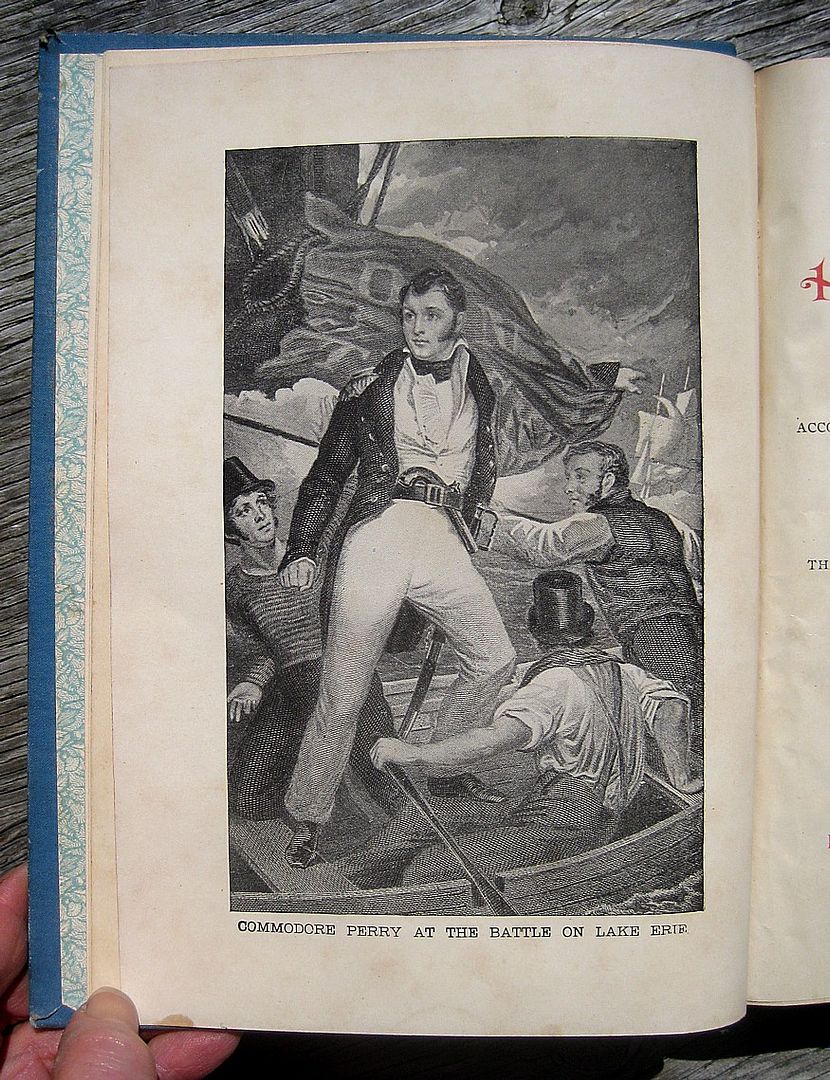
Condition: GOOD ANTIQUE CONDITION. Exterior as shown in photo. Binding good, inner hinges cracked/repaired. Text is clean and complete, light foxing. No torn, loose or missing pages. Bookplate inside front cover.Description:
From the Preface:
THERE is nothing more worthy of an American’s study than the history of his country. In our own land, however, the means of pursuing such a study are limited. Our great cities contain large and valuable public libraries, and the collections of our historical societies are rich and very complete ; but these are accessible only to the communities in which they are located, and are practically useless to the majority of the American people.The demand for a popular History of the United States has led the author to the preparation of this volume. He has endeavored to popularize the story of the nation, and at the same time to neglect nothing that could in the least contribute to a clear and comprehensive understanding of the subject.
He has sought to trace the history of the Republic from the discovery of the American continent to the present day, and has endeavored especially to fix the attention of the reader upon the various influences which have aided in moulding our national character, and have produced our distinctive political and moral national traits
He has endeavored to write from a broad national standpoint, and to cultivate in the minds of his readers that feeling of national patriotism which must ever be the safeguard of our country. It is a fitting time to consider the story of the past, to learn the lessons which it teaches, and to ponder the warnings which it conveys for the future.
In the short space of two centuries, the American people have grown from a small handful of hardy adventurers to a " mighty continental nation," increasing with a rapidity that is almost marvellous. They have built up their country on a scale of magnificence of which they are justly proud. They have covered it with powerful and free States, and splendid cities, connected by a network of railways, telegraphs, navigable rivers, and canals, which bind all the scattered parts into one solid whole. They have made a commerce and a system of manufactures before which the fabled wealth of Tyre sinks into insignificance.
They have created new light upon, or impart a literature which commands the respect of the world ; they have illustrated their history with deeds of arms not less splendid than their more peaceful achievements, and have given to the world names in every walk of life that will never die. They have shown that liberty and power can go hand in hand; they have made themselves a nation in which God is feared, and of which Christianity is the basis, in which ignorance and vice are despised, and in which the great lesson that lib- erty is possible only to an educated and virtuous people is being practically demonstrated.
This is a grand history — a record of the highest achievement of humanity — the noblest, most thrilling, and glorious story ever penned on earth. Yet the fact remains that the great mass of the American people are but imperfectly acquainted with it. There is a real need that we should know better than we do what we have done. It is only by a thoughtful study of our past that we can safely provide for the perils of the future.
We have triumphed over adversity, and we are now called upon to bear the test of success. He can be no good citizen who is ignorant of his country’s history.
In the preparation of this volume, no authority of importance has been overlooked; the author has carefully searched every source of information open to him ; and has availed himself of every fact that could throw additional interest to the subject under consideration.
In the narration of military events, he has preferred to give each campaign as a whole rather than to mingle several by presenting the events in chronological order. At the same time he has sought to preserve the inter-relation of events in one field of operations to those in the others.
The book is offered to the public in the sincere hope that it may induce its readers to take to heart the lessons which our history teaches, and to set a higher value upon the precious heritage of constitutional liberty which our fathers won for us with their blood, and handed down to us in trust for our children's children.
For your convenience, I have summarized the Contents and illustrations of this book below. Further down the page you can see some of the illustrations for yourself.
I hope you’ll take a moment to have a look.
Contents Are:
BOOK I – DISCOVERY OF THE WESTERN CONTINENT
CHAPTER ONE ~ STRANGE PEOPLE IN A STRANGE LAND: Strange People in a Strange Land * Earliest Inhabitants of the United States * The Mound Builders * Remarkable Works Constructed by Them * Evidences of a Primitive Civilization * Indications of the Antiquity of this Period * A Remarkable Cherokee * Who Were the Mound Builders * Ancient Phoenicians * False Assumption * The American Indians * Divisions of the Country Among the Tribes * Names and Location of the Various Tribes * Organization and Government of the Indians * Their Dress, Manners and Customs * Villages * Indian Inventions * The War Dance * Legends of the Norsemen Respecting the Discovery of America
CHAPTER TWO ~ THE VOYAGES OF COLUMBUS: The Voyages of Columbus. Maritime Enterprise in the Fifteenth Century * Theories Respecting the Earth's Surface * Christopher Columbus * His Early Life * His Theory of a Western Passage to India * His Struggles to Obtain the Means of Making a Voyage Is Aided by Ferdinand and Isabella of Spain * His First Voyage * Discovery of America * Reception in Spain * His Second Voyage * Settlement of Hayti * Third Voyage of Columbus * He Reaches the Mainland * Discovery of Gold in Hayti * Troubles in the Colony * Columbus Sent to Spain in Irons * Indignation of the Queen * Last Voyage of Columbus * His Shipwreck * Returns to Spain * Refusal of Ferdinand to Comply with His Promises * Death of Columbus * Amerigo Vespucci * Origin of the Name America
CHAPTER THREE ~ ENGLISH AND FRENCH DISCOVERIES: Discovery of the North American Continent by John Cabot * Voyages of Sebastian Cabot * The English Fail to Follow Up these Discoveries * Efforts of the French to Explore America * Voyage and Discoveries of Verrazzani * Cartier Explores the St. Lawrence * Reaches Montreal * Efforts to Found a Colony on the St. Lawrence * Failure * Roberval's Colony * Trading Voyages * Explorations of Champlain * Colonization of Nova Scotia * Founding of Quebec * Discovery of Lake Champlain * Arrival of the Jesuits in Canada * Death of Champlain
CHAPTER FOUR ~ THE SPANIARDS IN AMERICA: Settlement of the West Indies * Discovery of the Pacific Ocean * Voyage of Magellan * Discovery of Florida * Ponce de Leon’s Search for the Fountain of Youth * Vasquez de Ayllon Kidnaps a Cargo of Indians * Effort of Pamphilo de Narvaez to Conquer Florida * A Terrible March * The Voyage on the Gulf of Mexico * Fate of the Fleet * Escape of Cabeza de Vaca and His Comrades * Discovery of New Mexico * Ferdinand de Soto * Obtains Leave to Conquer Florida * Sails from Spain * Arrival in Cuba * Departure for Florida * Landing at Tampa Bay * Events of the First Year * De Soto Enters Georgia * Descends the Alabama * Battle of Mavilla * Destruction of Chickasaw * Sufferings of the Spaniards * Discovery of the Mississippi * The Spaniards Cross the Great River * De Soto in Arkansas * Reaches the Mississippi Again * Sickness and Death of De Soto * His Burial * Escape of His Followers to Mexico * The Huguenot Colony in Carolina * Its Failure * The French Settle in Florida * Wrath of Philip II. * Melendez Ordered to Exterminate the Huguenots * Foundation of St. Augustine * Massacre of the French at Fort Carolina * The Vengeance of De Gourges
CHAPTER FIVE ~ THE FIRST ENGLISH COLONY: The English Claim to America * Voyages of Frobisher * Exploits of Sir Francis Drake * Sir Humphrey Gilbert * Intends to found a Colony in America * Is lost at Sea * Sir Walter Raleigh obtains a Patent of Colonization * Discoveries of Amidas and Barlow * Raleigh sends out a Colony to Virginia * Settlement on Roanoke Island * Its Failure * Arrival of Grenville * Second Effort of Raleigh to Colonize Virginia * Roanoke Island again Settled * The “City of Raleigh” * Virginia Dare * Fate of the Colony * Death of Raleigh * Other Voyages of the English BOOK II – SETTLEMENT OF AMERICA
CHAPTER SIX: Captain John Smith and Pocahontas * Formation of the London Company * Conditions of its Charter * Departure of the first Colony * Quarrels during the Voyage * Arrival in the Chesapeake * Settlement of Jamestown * Formation of the Government * Character of Captain John Smith * Exploration of the James River * Newport and Smith visit Powhatan * Smith Admitted to the Government * Explores the Chickahominy * Is Captured and Sentenced to Death * Is Saved by Pocahontas * Gains the Friendship of Powhatan for the Colony * Returns to Jamestown * His Decisive Measures * Return of Newport * Smith Explores the Chesapeake Bay * The new Emigrants * Smith compels them to Labor * Smith is wounded and compelled to return to England * Disasters to the Colony * Arrival of Sir Thomas Gates * Jamestown Abandoned * Arrival of Lord Delaware * The Return to Jamestown * A Change for the Better * New Settlements * Sir Thomas Gates arrives with Reinforcements * Capture of Pocahontas by Captain Argall * She is Baptized * Marries John Rolfe * Sir Thomas Dale's Administration * Yeardley Governor * The first Legislative Assembly * Representative Government established in America * The Colonists obtain Wives * Changes in the Government
CHAPTER SEVEN ~ PROGRESS OF THE VIRGINIA COLONY: Introduction of Negro Slavery into Virginia * Efforts of the Assembly to Restrict Slavery * The Indians Attempt the Destruction of the Colony * Terrible Sufferings of the Whites * Aid from England * The Indian War Begun * King James Revokes the Charter of the London Company * Charles I. Desires a Monopoly of the Tobacco Trade * Action of the Assembly * Sir William Berkeley's First Administration * Severe Measures against Dissenters * Close of the Indian War * Death of Opechancanough * Emigration of Royalists to Virginia * Virginia and and the Commonwealth * Treaty with England * The Assembly Asserts its Independence of the Governor * The Restoration * Berkeley Chosen Governor by the Assembly * His Hypocrisy
CHAPTER EIGHT ~ VIRGINIA AFTER THE RESTORATION: Characteristics of the Virginians * Causes of the Success of the Royalists * Growth of the Aristocratic Class * Berkeley decides against the People * The Aristocratic Assembly Claims the Right to sit Perpetually * Deprives the Common People of their Liberties * Revival of the Navigation Act by Charles II. * The King bestows Virginia as a Gift upon his Favorites * Protests of the Assembly * Growing Hostility of the Virginians to the Colonial Government * The Indian War * The Governor Refuses to allow the Colonists to Defend themselves * Nathaniel Bacon * He Marches against the Indians * Rebellion of the People against Berkeley and the Assembly * The Convention * Repeal of the Obnoxious Laws * Berkeley's Duplicity * The People take up Arms * Flight of Berkeley * Destruction of Jamestown * Death of Bacon * Causes of the Failure of the Rebellion * Berkeley's Triumph * Execution of the Patriot Leaders * Berkeley's Course Condemned by the King * Death of Berkeley * The Unjust Laws Reenacted * Lord Culpepper Governor * His Extortions * James II. and Virginia * Effects upon Virginia of the Revolution of 1688 * William and Mary College Founded
CHAPTER NINE ~ THE COLONIZATION OF MARYLAND: Extent of the Territory of Virginia * Claybom's Trading-Posts established * Sir George Calvert, Lord Baltimore * Becomes interested in American colonization * Obtains a Grant of Maryland * Terms of the Charter * A Colony sent out * Arrival in the Chesapeake * St. Maiy's Founded * Charter of the Colony * Friendly Relations established with the Indians * First Legislature of Maryland * Trouble with Clayborne * Rapid Growth of the Colony * Progress of Popular Liberty * Policy respecting the Treatment of the Indians * Clayborne's Rebellion * Law granting Religious toleration enacted * Condition of Maryland under the Commonwealth * The People declared Supreme * Lord Baltimore recovers his Proprietary Rights * Characteristics of the Colony * Rapid Increase in Population * Charles Calvert, Governor * Death of the second Lord Baltimore * Roman Catholics disfranchised * Maryland becomes a Royal Province * Triumph of the Protestants * Annapolis made the Seat of Government * Restoration of the Proprietary Government * Continued Prosperity of Maryland
CHAPTER TEN ~ THE PILGRIM FATHERS: Rise of the Puritans * Their Increase in England * They are Persecuted by the English Church and Government * Conduct of James I. * His Hatred of Puritanism * Puritans take Refuge in Holland * The Congregation of John Robinson * They Escape to Holland * The Pilgrims * Their Sojourn at Leyden * They wish to Emigrate to Virginia * Failure of their Negotiations with the London Company * They form a Partnership in England * A Hard Bargain * Departure of the Pilgrims from Holland * Voyage of the "Mayflower" * Arrival in New England * The Agreement on board the " Mayflower" * Carver chosen Governor * Settlement of Plymouth * The first Winter in New England * Sufferings of the Pilgrims * Arrival of new Emigrants * Continued Suffering * Assignment of Lands * Friendly Intercourse with Indians * Samoset and Squanto * Visit of Massasoit * A Threat of War * Bradford's Defiance * Weston's Men * A Narrow Escape * The Colonists Purchase the Interests of their English Partners * Lands Assigned in Fee Simple * The Colony Benefited by the Change * Government of Plymouth * Steady Growth of the Colony
CHAPTER ELEVEN ~ SETTLEMENT OF MASSACHUSETTS AND RHODE ISLAND: Settlement of New Hampshire * The English Puritans determine to form a new Colony in America * The Plymouth Council * A Colony sent out to Salem under Endicott * Colonization of Massachusetts Bay begun * Charter obtained * Concessions of the King * Progress of the Salem Colony * The Charter and Government of the Colony removed to New England * Arrival of Governor Winthrop * Settlementof Boston * Sufferings of the Colonists * Roger Williams * His Opinions give offence to the Authorities * The Success of the Bay Colony Established * Growth of Popular Liberty * The Ballot Box * Banishment of Roger Williams * He goes into the Wilderness * Founds Providence * Growth of Williams's Colony * Continued Growth of Massachusetls * Arrival of Sir Henry Vane * Is elected Governor * Mrs. Anne Hutchinson * The Antinomian Controversy * Mrs. Hutchinson banished * Settlement of Rhode Island * Murder of Mrs. Hutchinson
CHAPTER TWELVE ~ COLONIZATION OF CONNECTICUT: The Dutch claim the Connecticut Valley * They build a Fort at Hartford * Governor Winslow makes a Lodgment in Connecticut for the English * Withdrawal of the Dutch * The First Efforts of the English to Settle Connecticut * Emigration of Hooker and his Congregation * They Settle at Hartford * Winthrop builds a Fort at Saybrook * Hostility of the Indians * Visit of Roger Williams to Miantonomoh * A Brave Deed * The Pequod War * Capture of the Indian Fort * Destruction of the Pequod Tribe * Effect of this War upon the other Tribes * Connecticut Adopts a Constitution * Its Peculiar Features * Settlement of New Haven
CHAPTER THIRTEEN ~ THE UNION OF THE NEW ENGLAND COLONIES: Feeling of the Colonies towards England * Hostility of the English Government to New England * Efforts to Introduce Episcopacy * Massachusetts Threatens Resistance * The Revolution in England * Establishment of Free Schools in New England * Harvard College * The Printing Press * The Long Parliament Friendly to New England * The United Colonies of New England * Rhode Island obtains a Charter * Maine Annexed to Massachusetts * The Quakers are Persecuted * Efforts to Christianize the Indians * John Eliot, the Apostle to the Indians
CHAPTER FOURTEEN ~ NEW ENGLAND AFTER THE RESTORATION: Arrival of the News of the Restoration of Charles II * The Regicides in New England * They are Protected * Revival of the Navigation Acts * Effect of this Measure upon the New England Colonies * Massachusetts delays the Proclamation of the King * Connecticut obtains a Charter * Union of New Haven with the Connecticut Colony * Rhode Island given a new Charter * Massachusetts settles her difficulties with the Crown * Changes in the Government * High-handed acts of the Royal Commissioners * Troubles with the Indians * Injustice of the Whites * King Philip's War * Forest Hero * An Incident in the Attack upon Hadley * Sufferings of the Colonies * Destruction of the Narragansetts * Death of Philip * Close of the War * England asserts her right to Tax the Colonies * Massachusetts buys Gorges' claims to Maine * New Hampshire made a separate Province * James II Revokes the Charter of Massachusetts * Dudley and Randolph in New England * Andros appointed Governor-General * His Tyranny * He demands the Charter of Connecticut * It is carried away and Hidden * The Charter Oak * Fall of James II. * The people of Massachusetts take up arms * Andros arrested * Effects of the Revolution upon New England
CHAPTER FIFTEEN ~ WITCHCRAFT IN MASSACHUSETTS: Results of the Failure of Massachusetts to Resume her Charter * The New Charter * Loss of the Liberties of the Colony * Union of Plymouth with Massachusetts Bay * Belief in Witchcraft * The History of Witchcraft in Massachusetts * The Case of the Goodwin Children * Cotton Mather espouses the Cause of the Witches * Samuel Parris * He Originates the Salem Delusion * A Strange History * A Special Court Appointed for the Trial of the Witches * The Victims * Execution of the Rev. George Burroughs * Cotton Mather's Part in the Tragedies * The General Court takes Action in behalf of the People * End of the Persecution * Failure of Cotton Mather's Attempt to Save his Credit
CHAPTER SIXTEEN ~ THE SETTLEMENT OF NEW YORK: Voyages of Henry Hudson * He is Employed by the Dutch * Discovery of the Hudson River * Early Dutch Voyages * Adrian Block * Fate of Hudson * The Dutch build a Fort on Manhattan Island * Settlement of New Amsterdam * The Province named New Netherlands * Fort Nassau * Peter Minuits Governor * The Dutch Settlement of Delaware * Wouter Van Twiller * Kieft Governor * His Unjust Treatment of the Indians * Massacre of the Indians at Hoboken * The Indian War * Stuyvesant Appointed Governor * Disputes with the English in Connecticut * The Swedes Settle Delaware * Stuyvesant Captures the Swedish Forts * Growth of New Amsterdam * Disputes between the People and Governor * Growing Spirit of Popular Liberty * The People Appeal to the States General * Capture of New Netherlands by the English * The Name of the Province changed to New York * Results of the English Conquest * Progress of New Jersey * Andros Governor of New York * He Fails to Establish his Authority over Connecticut * New York allowed an Assembly * Discontents of the People * Leisler's Rebellion * Execution of Leisler and Milbourne * Fletcher Governor * His Attempt to obtain Command of the Connecticut Militia * Episcopacy Established in New York * The Freedom of the Press Sustained * New Jersey a Royal Province
CHAPTER SEVENTEEN ~ COLONIZATION OF PENNSYLVANIA: The Quakers * Their Origin and Doctrines * William Penn * Becomes a Quaker * Is Persecuted for his Religious Opinions * Becomes interested in American Colonization * Purchases West Jersey from the Proprietor * Conceives the Idea of Founding a Free State in America * Purchases Pennsylvania from Charles II. * Conditions of his Charter * Sends out a Colony * Arrival of Penn in America * Philadelphia Founded * Penn's Treaty with the Indians * Religious Toleration Guaranteed * Penn's Relations with his Colonists * Rapid Growth of Pennsylvania in Population and Prosperity * William Penn and James II. * Renewal of Penn's Troubles * William III Declares Pennsylvania a Royal Province * Penn is Vindicated and Restored to his Proprietary Rights * His Return to Pennsylvania * Character of the Settlers of the Province * Penn Goes Back to England * Efforts to deprive him of his Possessions * His Death
CHAPTER EIGHTEEN ~ SETTLEMENT OF THE CAROLINAS: Gradual Settlement of North Carolina from Virginia * Charles II. grants Carolina to Clarendon and others * The " Grand Model " * An Ideal Aristocracy Proposed for Carolina * The Authority of the Proprietaries Established in North Carolina * Continued Settlement of that Region * Characteristics of the Early Settlers of North Carolina * The People Reject the Grand Model * Hostility of England to the Colonial Commerce * Insurrection in North Carolina * Slothel Governor * Settlement of South Carolina * Charleston Founded * The Proprietary Constitutions Rejected by South Carolina * Rapid Growth of the Colony * Introduction of Slavery * Chracteristics of the Early Settlers of South Carolina * Efforts to Enforce the Navigation Acts * Resistance of the People * The Proprietaries Abandon their Constitutions * Archdale's Reforms * Religious Intolerance * Establishment of the Church of England in South Carolina * Action of the Crown * Continued Prosperity of South Carolina * Governor Moore Attacks St. Augustine * Failure of the Effort * The Spaniards are Repulsed in an Attempt to Capture Charleston * Indian War in North Carolina * The Tuscaroras Driven Northward * War with the Yemmassees * Destruction of their Power * Separation of the Carolinas
CHAPTER NINETEEN ~ SETTLEMENT OF GEORGIA: General James Edward Oglethorpe * His Efforts to Reform Prison Discipline of England * Proposes to Found a Colony in America for the Poor and for Prisoners for Debt * A Charter Obtained from the King * Colonization of Georgia * Savannah Settled * First Years of the Colony * Labors of Oglethorpe * Arrival of New Emigrants * Augusta Founded * The Moravian Settlements * The Wesleys in America * George Whitefield * War between England and Spain * Oglethorpe Invades Florida * Failure of the Attack upon St. Augustine * The Spaniards Invade Georgia * Oglethorpe's Stratagem * Its Success * Battle of" Bloody Marsh " * Close of the War * Charges against Oglethorpe * His Vindication * His Return to Europe * Changes in the Colonial Government * Introduction of Slavery into Georgia * Prosperity of the Colony
CHAPTER TWENTY ~ THE FRENCH IN THE VALLEY OF THE MISSISSIPPI: Origin of the Hostility of the Iroquois to the French * Settlement of Canada * Plans of the French respecting the Indians * The Jesuits * Their Work in America * Success of their Missions * The Early Missionaries * Foundation of a College at Quebec * Efforts of the Jesuits to Convert the Iroquois * Father Jogues * Death of Ahasistari * Father Allouez * The Missions on the Upper Lakes * Father Marquette * His Exploration of the Upper Mississippi * Death of Marquette * La Salle * Efforts of France to Secure the Valley of the Mississippi * La Salle Descends the Mississippi to its Mouth * His Effort to Colonize the Lower Mississippi * The First Colony in Texas * Its Failure * Death of La Salle * Lemoine d'lbberville * Settlement of Louisiana * Colony of Biloxi * Settlement of Mobile * Crozat's Monopoly * Founding of New Orleans * Detroit Founded * Slow Growth of the French Colonies * Occupation of the Ohio Valley by the French * Wars with the Indians * Extermination of the Natchez Tribe * War with the Chickasaws
CHAPTER TWENTY-ONE ~ CONFLICTS BETWEEN THE ENGLISH AND FRENCH: Relations Between the English and the Five Nations * The Hostility of the Latter to the French * King William's War * Destruction of Dover * The Jesuit Missionaries Incite the Indians to Attack the English * Expedition against Quebec * Attack on Dustin's Farm * Peace of Ryswick * Hostility of the English to Roman Catholics * Queen Anne's War * Burning of Deerfield * Eunice Williams * Cruelties of the French * Effort of New England to Conquer Acadia * Capture of Port Royal * Failure of the Expedition against Quebec * King George's War * Expedition against Louisburg * Its Composition * Arrival of the Fleet at Cape Breton * Good Conduct of the Provincials * Capture of Louisburg * Treaty of Aix-la-Chapelle * Unjust Treatment of the Colonies by England * Sentiment of the Americans towards England BOOK III – THE FRENCH AND INDIAN WAR
CHAPTER TWENTY-TWO ~ OUTBREAK OF HOSTILITIES: England Claims the Valley of the Ohio * Organization of the Ohio Company * The French Extend their Posts into the Ohio Country * Washington's Mission to the French at Fort Duquesne * His Journey * Reception by the French * His Journey Home * A Perilous Undertaking * Organization of the Virginia Forces * Washington Made Second in Command * The French Drive the English from the Head of the Ohio * Fort Duquesne Built by Them * Washington Crosses the Mountains * The Fight at Great Meadows * Beginning of the French and Indian War * Surrender of Fort Necessity to the French * Unjust Treatment of the Colonial Officers * Congress of the Colonies at New York * Franklin's Plan of a Union of the Colonies * Its Failure * Reasons of the British Government for Rejecting It * England Assumes the Direction of the War * Arrival of General Braddock * Plan of Campaign * Obstinacy of Braddock * He Passes the Mountains * Defeat of Braddock * Heroism of Washington * Retreat of Dunbar beyond the Mountains * Vigorous Action of Pennsylvania * Armstrong Defeats the Indians and Burns the Town of Kittanning
CHAPTER TWENTY-THREE ~ SANGUINARY STRUGGLES ON THE FRONTIER: Expedition against Acadia * Brutal Treatment of the Acadians * They Are Expelled from their Country * A Sad Story * Fate of the Acadians * Johnson at Lake George * March of Dieskau * Battle of Lake George * Failure of Shirley's Expedition * Arrival of the Earl of Loudon * Montcalm in Canada * Capture of Oswego by the French * Outrages of the Earl of Loudon upon New York and Philadelphia * Expedition against Louisburg * How the Earl of Loudon Beat the French * Capture of Fort William Henry by Montcalm * Massacre of the Prisoners by the Indians * Efforts of Montcalm to Save Them * The Royal Officers Attempt to Cover Their Failures by Outraging the Colonies
CHAPTER TWENTY-FOUR ~ END OF THE FRENCH AND INDIAN WAR: A Change for the Better * William Pitt Prime Minister * Vigorous Measures Adopted * Recall of the Earl of Loudon * Capture of Louisburg * Abercrombie on Lake George * Advances against Ticonderoga * Death of Lord Howe * Failure of the English Atttack upon Ticonderoga * Disgraceful Conduct of Abercrombie * His Retreat * Capture of Fort Frontenac * Advance of General Forbes * Grant's Defeat * The Virginians Again Save the Regulars * Capture of Fort Duquesne * Washington Retires from the Army * Ticonderoga and down Point Occupied by the English * Capture of Fort Niagara * The Expedition against Quebec * Failure of the First Operations * Despondency of Wolfe * He Discovers a Landing-place * The Army Scales the Heights of Abraham * Montcalm's Surprise * Battle of the Plains of Abraham * Death of Wolfe * Defeat of the French * Death of Montcalm * Surrender of Quebec * Capture of Montreal * Treaty of Paris * Canada Ceded to England * France Loses all Her American Possessions * The Cherokee War * Hostility of the Indians to the English * Pontiac's War * Death of Pontiac * Bouquet Relieves Fort Duquesne * Results of the War BOOK IV – THE AMERICAN REVOLUTION
CHAPTER TWENTY-FIVE ~ CAUSES OF THE STRUGGLE FOR INDEPENDENCE: Injustice of Great Britain towards Her Colonies * The Navigation Acts * Effects of these Laws upon the Colonies * Great Britain Seeks to Destroy the Manufactures of America * Writs of Assistance * They Are Opposed * Home Manufactures encouraged by the Americans * Ignorance of Englishmen Concerning America * Great Britain Claims the Right to Tax America * Resistance of the Colonists * .Samuel Adams * The Parsons' Cause * Patrick Henry * England Persists in Her Determination to Tax America * Passage of the Stamp Act * Resistance of the Colonists * Meeting of the First Colonial Congress * Its Action * William Pitt * Repeal of the Stamp Act * Franklin before the House of Commons * New Taxes Imposed upon America * Increased Resistance of the Colonies * Troops Quartered in Boston * The " Massacre " * The Non-Importation Association * Growth of Hostility to England * Burning of the " Gaspee" * The Tax on Tea Retained by the King * Destruction of Tea at Boston * Wrath of the British Government * Boston Harbor Closed * Troops Quartered in Boston * The Colonists Come to the Assistance of Boston * Action of the Virginia Assembly * General Gage in Boston * The Regulating Act * Its Failure * Gage Seizes the Massachusetts Powder * Uprising of the Colony * Meeting of the Continental Congress * Its Action * Addresses to the King and People of England * The Earl of Chatham's Endorsement of Congress * The King Remains Stubborn
CHAPTER TWENTY-SIX ~ PROGRESS OF THE WAR: Gage fortifies Boston Neck * He Summons the General Court * Recalls his Proclamation * The Provincial Congress of Massachusetts * It takes Measures for Defence * The Militia Organized * The Minute Men * Friends of America in England * Gage resolves to seize the Stores at Concord * Midnight March of the British Troops * The Alarm given * Skirmishes at Lexington and Concord * Retreat of the British * A Terrible March * Uprising of New England * Boston Invested * Dunmore seizes the Virginia Powder * Is made to pay for it * Uprising of the Middle and Southern Colonies * The Mecklenburg Declaration of Independence * Capture of Ticonderoga and Crown Point * Meeting of the Second Continental Congress * Congress resolves to sustain Massachusetts * Renewed Efforts for Peace * Congress Assumes the General Government of the Colonies * A Federal Union Organized * Its Character * A Continental Army formed * George Washington Appointed Commander-in-chief * General Officers Appointed * Condition of the Army before Boston * Inaction of Gage * Battle of Breed's Hill * A Glorious Defence * The Battle Equivalent to a Victory in its Effects upon the Country * Arrival of Washington at Cambridge * He takes Command of the Army * He Reorganizes the Army * Difficulties of the Undertaking * The Invasion of Canada Resolved upon * March of Montgomery and Arnold * Rapid Successes of Montgomery * He Captures Montreal * March of Arnold through the Wilderness * Arrival before Quebec * Forms a Junction with Montgomery * The Siege of Quebec * The Ice Forts * Failure of the Attack * Death of Montgomery * Retreat of the Americans from Canada * Lord Dunmore's War in Virginia * Destruction of Norfolk * The Thirteen United Colonies * Burning of Falmouth * Naval Matters * Action of Great Britain * The War to be carried on * The Hessians
CHAPTER TWENTY-SEVEN ~ THE DECLARATION OF INDEPENDENCE: The Siege of Boston * Difficulties of the American Army * Activity of the Privateers * Clinton's Expedition * Colonel Knox arrives from Ticonderoga with Cannon * Seizure of Dorchester Heights by Washington * The British Evacuate Boston * Royalist Plots in New York * Paper Money Issued by Congress * Gates sent to the North * The British Attack Charleston * Battle of Fort Moultrie * The Howes in New York Bay * Change in the Character of the War * Growing Sentiment in Favor of Independence * * Virginia Proposes the Colonies Assert their Independence * Action of Congress * The Declaration of Independence * Articles of Confederation Adopted by Congress * Lord Howe's Efforts at Conciliation * Addresses a Letter to Washington * Battle of Long Island * Defeat of the Americans * Retreat from Long Island * Evacuation of New York by the Americans * Loss of Fort Washington * Washington Retreats through New Jersey * He Crosses the Delaware * Darkest Period of the War * Washington's Determination to Continue the War * Lord Howe's Proclamation * Its Effect * Congress at Baltimore * Carleton invades New York * Defeats Arnold on Lake Champlain * Carleton Retires into Canada * Battle of Trenton * Happy Effects of the Victory * Congress confers Dictatorial Powers upon Washington * Commissioners sent to France
CHAPTER TWENTY-EIGHT ~ THE YEAR 1777: Howe Attempts to Crush Washington * Battle of Princeton * The British Confined to the Seaboard * Recovery of New Jersey * The American Army in Winter Quarters at Morristown * Effects of the American Successes * Difficulty of Procuring Troops * Washington Refuses to Exchange Prisoners * His Course Approved by Congress * Measures of Congress * Naval Affairs * Tryon Bums Danbury * Gallantry of Arnold * Troubles in the Northern Department * Congress Adopts a National Flag * "The Stars and Stripes" * Course of France towards the United States * France Decides to Assist the Americans * Lafayette * His Arrival in America * Capture of the British General Prescott * Howe Threatens Philadelphia * Washington Moves Southward * Battle of the Brandywine * Washington Retreats to the Schuylkill * Wayne's Defeat at Paoli * Philadelphia Exacuated by the Americans * It Is Occupied by the British * Battle of Germantown * The British Attack the Forts on the Delaware * They Are Abandoned by the Americans * Burgoyne's Army in Canada * Advance of Burgoyne into New York * Investment of Ticonderoga * It Is Abandoned by the Americans * The Retreat to Fort Edward * Burgoyne Reaches the Hudson * Murder of Miss McCrea * Siege of Fort Schuyler * Battle of Bennington * Critical Situation of Burgoyne * Gates in Command of the American Army * Battles of Bemis’ Heights and Stillwater * Surrender of Burgoyne's Army * Clinton in the Highlands
CHAPTER TWENTY-NINE ~ AID FROM ABROAD: Sufferings of the Army at Valley Forge * .Appeals of Washington to Congress * The British in Philadelphia * The Conway Cabal * Its Disgraceful Failure * Efforts to Improve the Army * Worthlessness of Continental Bills * General Lee Exchanged * Effect of Burgoyne's Surrender upon England * The King Is Forced to Agree to Measures of Conciliation * * Action of France * Louis XVI. Recognizes the Independence of the United States * Alliance Between the United States and France * Failure of the British Measures of Conciliation * Clinton Evacuates Philadelphia * Battle of Monmouth * General Lee Dismissed from the .Army * .Attack upon Newport * Its Failure * Withdrawal of the French Fleet to the West Indies * Outrages of the British on Long Island Sound * Massacre of Wyoming * The Winter of 1779-80 * The Army in Winter Quarters * Robert Morris * Condition of Congress * Georgia Subdued by the British * Prevost Attempts to Take Charleston * Siege of Savannah * Its Failure * Capture of Stony Point * Capture of Paulus Hook * The Indians Punished * Naval Affairs * Exploits of John Paul Jones * Evacuation of Newport * Settlement of Kentucky * Conquest of the Illinois Country bv George Rogers Clarke * Settlement of Tennessee.
CHAPTER THIRTY ~ THE CLOSE OF THE WAR: Severity of the Winter of 1779-80 * Sufferings of the American Army * Clinton .Sails for the Carolinas * Colonel Tarleton * Capture of Charleston * Conquest of South Carolina * Gates in Command of the Southern Army * Battle of Camden * Exploits of Marion and Sumter * Advance of Cornwallis * Battle of King's Mountain * Gates Succeeded by General Greene * Knyphausen's Expeditions into New Jersey * Arrival of the French Fleet and Army * Arnold's Treason * The Plot for the Betrayal of West Point * Arrest of Major Andre * Flight of Arnold * Execution of Andre * Mutiny of the Pennsylvania and New Jersey Troops * Measures of Congress * Arnold Captures Richmond, Virginia * Battle of the Cowpens * Masterly Retreat of General Greene * Cornwallis Baffled * Battle of Guilford Court House * Cornwallis at Wilmington * Battle of Hobkirk's Hill * Siege of Ninety-Six * Execution of Colonel Hayne * Battle of Eutaw Springs * Washington Decides to Attack New York * The French Army on the Hudson * Financial Affairs * Resumption of Specie Payments * Message from the Count De Grasse * Cornwallis at Yorktown * The American Army Moves Southward * Siege of Yorktown * Surrender of Cornwallis * Effect of the News in England * Indian Troubles * Efforts in England for Peace * Negotiations Opened * Treaty of Paris * End of the War * The Army Disbanded * Washington Resigns His Commission BOOK V - FROM THE CLOSE OF THE REVOLUTION TO THE CIVIL WAR
CHAPTER THIRTY-ONE ~ THE ADOPTION OF THE CONSTITUTION: Washington's Administration. * Unsettled Condition of the Country * Failure of the Articles of Confederation * Desire for Reform * Meeting of the Federal Convention at Philadelphia * The Constitution of the United States * Adoption of a Decimal Currency * The Northwest Territory * Washington Elected President * His Journey to New York * Establishment of the New Government * The First Cabinet * Financial Measures * Removal of the Capital Agreed Upon * The Government at Philadelphia * The First Census * The Indians of the Northwest Conquered * Re-election of Washington * Division of Parties * The French Revolution * The United States Neutral * Citizen Genet * Efforts to Commit the United States to the French Alliance * Genet's Recall Demanded * The " Whiskey Insurrection" * Jay's Treaty with England * Opposition to It * Negotiations with Algiers * Political Disputes * Hostility to Washington * His Farewell Address * Its Effect upon the Country * Election of John Adams to the Presidency * Admission of Vermont, Kentucky and Tennessee * Retirement of Washington * His Administration
CHAPTER THIRTY-TWO ~ THE ADMINISTRATIONS OF JOHN ADAMS AND THOMAS JEFFERSON: Inauguration of John Adams * Aggressions of France upon the United States * The American Commissioners Insulted by the French Government * The Alien and Sedition Laws * The United States Prepare for War with France * France Signifies her Willingness to Treat * New Commissioners Appointed * Settlement of the Dispute * Hostilities at Sea * Capture of the "Insurgente" and "Vengeance" * Death of Washington * Removal of the Capital to Washington City * The Second Census * Inauguration of Thomas Jefferson * The President's Message * His First Measures * Admission of Ohio * Louisiana Purchased by the United States * War with the Barbary Powers * Burning of the " Philadelphia " * Re-election of Mr. Jefferson * Aaron Burr Kills Alexander Hamilton in a Duel * Burr's Subsequent Career * Fulton's Steamboat * Outrages of England and France upon American Commerce * American Vessels Searched and American Seamen Impressed by England * Efforts to Settle these Questions * Affairof the "Chesapeake" and "Leopard" * The Embargo * Results of this Measure * Losses of the Eastern States * Election of James Madison to the Presidency * Repeal of the Embargo.
CHAPTER THIRTY-THREE ~ THE ADMINISTRATION OF JAMES MADISON: The Second War with England * Inauguration of Mr. Madison * Negotiations with Mr. Erskine * Their Failure * Seiziure of American Vessels in France * Sufferings of American Ship-owners * Great Britain Stations her Ships of War off Amercan Ports * Affair of the " President " and " Little Belt" * Trouble with the Northwestern Indians * Tecumseh * Battle of Tippecanoe * Meeting of the Twelfth Congress * Measures for Defence * Admission of Louisiana into the Union * Death of George Clinton * The British Ultimatum * War Declared Against Great Britain * Opposition to the War * The British Offer of Settlement Rejected * The War for "Free Trade and the Sailors' Rights" * Mr. Madison Re-elected * Campaign of 1812 * Preparation for the Invasion of Canada * General Hull Surrenders Detroit to the British * Loss of the Northwestern Frontier * Failure of the Attack on Queenstown * Exploits of the Navy * Capture of the " Guerriere" by the " Constitution " * The Privateers * Russia Offers to Mediate between the United States and Eng!and * Financial Affairs * Harrison’s Campaign * Massacre at the River Basin * Defence of Forts Meigs and Stephenson * Perry’s Victory on Lake Erie * Battle of the Thames * Death of Tecumseh * Recovery of the Northwest * Capture of York * British Attack on Sackett's Harbor Repulsed * Removal of General Dearborn * Failure of the Campaign on the Lower Lakes * The Creek War * Jackson's Victories * Naval Affairs * The British Outrages in Chesapeake Bay * Negotiations for Peace * Capture of Fort Erie * Battles of Chippewa and Lundy's Lane * Siege of Fort Erie * Successes of the Americans * Advance of Prevost * Battle Plattsburgh * Macdonough's Victory on Lake Champlain * Battle of Bladensburg * Capture of Washington * Destruction of the Public Buildings by the British * Attack on Baltimore * Death of General Ross * " The Star- Spangled Banner " * The British Attack on the New England Coast * Opposition of New England to the War * The Hartford Convention * The British in Florida * General Jackson Expels Them * Jackson at New Orleans * Arrival of the British Expedition off the Coast * Vigorous Measures of Jackson * Battle of New Orleans * Defeat of the British * Naval Affairs * The Treaty of Peace * The Barbary Powers Humbled * The Tariff * The Bank of the United States * Admission of Indiana * James Monroe Elected President
CHAPTER THIRTY-FOUR ~ ADMINISTRATIONS OF JAMES MONROE AND JOHN QUINCY ADAMS: Inauguration of Mr. Monroe * His Tour through the Eastern States * Admission of Mississippi into the Union * Troubles with the Indians * General Jackson's Vigorous Measures against the Spaniards in Florida * Purchase of Florida by the United States * Illinois Becomes a State * The First Steamship * Maine Admitted into the Union * The Slavery Question * The Missouri Compromise * Admission of Missouri as a State * The Fourth Census * Reelection of Mr. Monroe * The Tariff * Protective Policy of the Government * Recognition of the Spanish Republics * The Monroe Doctrine * Visit of Lafayette to the United States * Retirement of Mr. Monroe * John Quincy Adams Elected President * His Inauguration * Rapid Improvement of the Country * Increase of Wealth and Prosperity * Internal Improvements * The Creek Lands in Georgia Ceded to the United States * Death of Thomas Jefferson and John Adams * The Anti- Masons * The Tariff of 1828 * Andrew Jackson Elected President
CHAPTER THIRTY-FIVE ~ ADMINISTRATIONS OF ANDREW JACKSON AND MARTIN VAN BUREN: Character of Andrew Jackson * Indian Policy of this Administration * The President Vetoes the Bill to Renew the Charter of the United States Bank * Debate Between Hayne and Webster * Jackson's Quarrel with Calhourn * Death of ex- President Monroe * The Cholera * Black Hawk's War * Reelection of President Jackson * The Tariff * Action of South Carolina * The Nullification Ordinance * Firmness of the President * The Matter Settled by Compromise * Patriotism of Henry Clay * The Removal of the Deposits * The Seminole War Begun * Great Fire in New York * Settlement of the French Claims * Arkansas Admitted into the Union * The National Debt Paid * Death of ex- President Madison * Martin Van Buren Elected President * Michigan Admitted into the Union * The Panic of 1837 * Causes of It * Suspension of Specie Payments * Great Distress throughout the Union * The Sub-Treasury * Repudiation of State Debts * The Canadian Rebellion * The President's Course * The Seminole War Ended * The Anti-Slavery Party * Resolutions of Congress Respecting Slavery * William Henry Harrison Elected President * The Sixth Census
CHAPTER THIRTY-SIX ~ ADMINISTRATIONS OF WILLIAM HENRY HARRISON AND JOHN TYLER: Administrations of William Henry Harrison and John Tyler * An Extra Session of Congress Summoned * Death of President Harrison * John Tyler Becomes President of the United States * Meeting of Congress * The Bankrupt Law * President Tyler Vetoes the Bills to Revive the United States Bank * His Quarrel with his Party * The " Tyler Whigs " * The Tariff of 1842 * The Treaty of Washington * The United States Will Not Tolerate the Exercise of the Right of Search * Dorr's Rebellion * The Mormons * Invention of the Electric Telegraph * Explosion on the " Princeton " * Efforts to Secure the Annexation of Texas * Early History of Texas * The Texan War of Independence * Battle of San Jacinto * Texan Independence Established * Texas Applies for Admission into the Union * Opposition to the Measure * Significance of the Vote at the Presidential Election * James K. Polk Elected President * Texas Admitted into the Union * Iowa and Florida Become States
CHAPTER THIRTY-SEVEN ~ ADMINISTRATION OF JAMES K. POLK: War with Mexico. * The Oregon Question * Position of President Polk Respecting It * The Question Settled * Treaty for Settlement of Claims against Mexico * Mexico Resents the Annexation of Texas * General Taylor Ordered to Texas * He Advances to the Rio Grande * Battles of Palo Alto and Resaca de la Palma * The War with Mexico Begun * Invasion of Mexico * Occupation of Matamoras * Action of the United States Government * Taylor Advances into the Interior * The Storming and Capture of Monterey * The Armistice * Return of Santa Anna to Mexico * President Polk Duped * Santa Anna Seizes the Mexican Government * General Wool Joins General Taylor * Troops Taken from Taylor's Army * Advance of the Mexicans * Battle of Buena Vista * Conquest of California by Fremont and Stockton * Occupation of Santa Fe * New Mexico Conquered * Doniphan's March * Occupation of Chihuahua * Sailing of Scott's Expedition * Reduction of Vera Cruz * Santa Anna Collects a New Army * Battle of Cerro Gordo * Occupation of Puebla by Scott * Trouble with Mr. Trist * Vigorous Measures of Santa Anna * Scott Advances upon the City of Mexico * El Penon Turned * Battles of Contreras and Churubusco * Capture of Molino del Rev * Storming of Chapultepec * Capture of the City of Mexico * Siege of Puebla Raised * Flight of Santa Anna * Treaty of Peace Negotiated * Close of the War * Acquisition of California and New Mexico * Discovery of Gold in California * Rapid Emigration to the Pacific * Death of John Quincy Adams * The Wilmot Proviso * Revival of the Slavery Question * General Taylor Elected President
CHAPTER THIRTY-EIGHT ~ ADMINISTRATIONS OF ZACHARY TAYLOR AND MILLARD FILLMORE: Character of General Taylor * Department of the Interior * Death of ex-President Polk * The Slavery Agitation * Views of Clay and Webster * California asks admission into the Union * Message of President Taylor * The Omnibus Bill * Efforts of Henry Clay * A Memorable Debate * Webster's " Great Union Speech " * Death of John C. Calhoun * Death of President Taylor * Millard Fillmore becomes President * Passage of the Compromise Measures of 1850 * Death of Henry Clay * Dissatisfaction with the Compromise * The Fugitive Slave Law Nullified, by the Northern States * The Nashville Convention * Organization of Utah Territory * The Seventh Census * The Expedition of Lopez against Cuba * The Search for Sir John Franklin * The Grinnell Expedition * Dr. Kane's Voyages * Inauguration of Cheap Postage * Laying the Cornerstone of the new Capitol * Death of Daniel Webster * Arrival of Kossuth * The President Rejects the Tripartite Treaty * Franklin Pierce elected President * Death of William R. King
CHAPTER THIRTY-NINE ~ THE ADMINISTRATION OF FRANKLIN PIERCE: Dispute with Mexico * The Gadsden Purchase * Surveys for a Pacific Railway * The Japan Expedition * Treaty with Japan * The Koszta Affair * The "Black Warrior " seized by the Cuban Officials * The "Ostend Conference" * Dismissal of the British Minister * The Kansas-Nebraska Bill * History of the Bill * Its Passage by Congress * History of the Struggle in Kansas * Conflict between the Pro-Slavery and Free Soil Settlers * Lawrence Sacked * Civil War * The Presidential Campaign of 1856 * James Buchanan elected President of the United States * Rap+id Increase of the Republican Party
CHAPTER FORTY ~ THE ADMINISTRATION OF JAMES BUCHANAN: Inauguration of Mr. Buchanan * The Mormon Rebellion * The Financial Crisis of 1857 * Laying of the Atlantic Telegraphic Cable * Minnesota admitted into the Union * The San Juan Affair * Admission of Oregon into the Union * The Kansas Question * The Lecompton Constitution * Its Defeat * The Wyandotte Constitution * Admission of Kansas into the Union * The John Brown Raid * Prompt Action of the Government * Brown and his Companions Surrendered to the State of Virginia * Their Trial and Execution * Presidential Campaign of 1860 * Rupture of the Democratic Party * Abraham Lincoln elected President of the United States * Secession of South Carolina * Reasons for this Act * Secession of the other Cotton States * Major Anderson Occupies Fort Sumter * Trying Position of the General Government * Course of Mr. Buchanan * The " Star of the West " fired upon by the South Carolina Batteries * Organization of the Confederate States of America * Jefferson Davis elected President of the Southern Republic * The Peace Congress * Its Failure BOOK VI – THE CIVIL WAR
CHAPTER FORTY-ONE ~ THE ADMINISTRATION OF ABRAHAM LINCOLN: Inauguration of President Lincoln * His History * The Confederate Commissioners at Washington * Attack upon Fort Sumter by the Confederates * The President calls for Troops * Response of the North and West * Secession of the Border States * Opening Events of the War in Virginia * Withdrawal of West Virginia * Admitted into the Union as a Separate State * Meeting of Congress * The West Virginia Campaign * Battle of Bull Run * The War in Missouri * Kentucky Occupied * The Blockade * Capture of Port Royal * The "Trent" Affair * Insurrection in East Tennessee * State of Affairs at the Opening of the Year 1862 * Edwin M. Stanton made Secretary of War * Capture of Forts Henry and Donelson * The Confederates fall back from Kentucky * Battle of Shiloh * Capture of Island No. 10 * Evacuation of Corinth * Capture of Memphis * Bragg's Kentucky Campaign * His Retreat into Tennessee * Battles of Iuka and Corinth * Battle of Murfreesboro', or Stone River * Grant's Campaign against Vicksburg * Its Failure * The War beyond the Mississippi * Battle of Pea Ridge * Capture of Roanoke Island * Capture of New Orleans * Surrender of Fort Pulaski * The War in Virginia * Johnston's Retreat from Centreville * Battle between the "Monitor " and " Virginia " * The Move to the Peninsula * Johnston Retreats to the Chickahominy * Battle of Seven Pines * Jackson's Successes in the Valley of Virginia * The Seven Days' Battles before Richmond * Battle of Cedar Mountain * Defeat of General Pope's Army * Lee Invades Maryland * Capture of Harper's Ferry * Battles of South Mountain and Antietam * Retreat of Lee into Virginia * McClellan Removed * Battle of Fredericksburg
CHAPTER FORTY-TWO ~ THE ADMINISTRATION OF ABRAHAM LINCOLN – THE CIVIL WAR, CONCLUDED: The Emancipation Proclamation * Battle of Chancellorsville * Death of Stonewall Jackson * Invasion of the North by Lee's Army * Battle of Gettysburg * Retreat of Lee into Virginia * Grant's Army crosses the Mississippi * Battle of Champion Hills * Investment of Vicksburg * Surrender of Vicksburg and Port Hudson * Battle of Chickamauga * Rosecrans Shut up in Chattanooga * Grant in command of the Western Armies * Battles of Lookout Mountain and Mission Ridge * Defeat of Bragg's Army * The Campaign in East Tennessee * Retreat of Longstreet * Capture of Galveston * Attack on Charleston * Capture of Fort Wagner * Charleston Bombarded * State of Affairs in the Spring of 1864 * The Red River Expedition * Grant made Lieutenant-General * Advance of the Army of the Potomac * Battles of the Wilderness, Spottsylvania and Cold Harbor * Sheridan's Raid * Death of General J. E. B. Stuart * Battle of New Market * Early sent into the Valley of Virginia * Butler's Army at Bermuda Hundreds * Grant crosses the James River * The Siege of Petersburg begun * Early's Raid upon Washington * Sheridan defeats Early at Winchester and Fisher's Hill * Battle of Cedar Creek * The final Defeat of Early's Army * Sherman's Advance to Atlanta * Johnston Removed * Defeat of Hood before Atlanta * Evacuation of Atlanta * Hood's Invasion of Tennessee * Battle of Franklin * Siege of Nashville * Hood Defeated at Nashville * His Retreat * Sherman's "March to the Sea" * Capture of Savannah * Battle of Mobile Bay * Attack on Fort Fisher * The Confederate Cruisers * Sinking of the "Alabama" by the "Kearsarge" * Re-election of President Lincoln * Admission of Nevada into the Union * The Hampton Roads Peace Conference * Capture of Fort Fisher * Occupation of Wilmington * Sherman advances through South Carolina * Evacuation of Charleston * Battles of Averysboro' and Bentonville * Sherman at Goldsboro' * Critical Situation of Lee's Army * Attack on Fort Steadman * Sheridan joins Grant * Advance of Grant's Army * Battle of Five Forks * Attack on Petersburg * Evacuation of Richmond and Petersburg * Retreat of Lee's Army * Richmond Occupied * Surrender of General Lee's Army * Rejoicings in the North * Assassination of President Lincoln * Death of Booth * Execution of the Conspirators * Johnston Surrenders * Surrender of the other Confederate Forces * Capture of Jefferson Davis * Close of the War
CHAPTER FORTY-THREE ~ THE ADMINISTRATION OF ANDREW JOHNSON: The Administration of Andrew Johnson * The New President * Return of the Army to Civil Life * The Public Debt * The Reconstruction Question * Action of the President * He declares the Southern States Readmitted into the Union * The Fifteenth amendment * Meeting of Congress * The President's Acts Annulled * Reconstruction Policy of Congress * The Fourteenth Amendment * The Freedman's Bureau and Civil Rights Bill * The Tenure of Office Act * Admission of Nebraska into the Union * The Southern States Organized as Military Districts * Admission of Southern States into the Union * The Fourteenth Amendment Ratified * President Johnson's Quarrel with Secretary Stanton * Impeachment of the President * His Acquittal * Release of Jefferson Davis * Indian War * The French in Mexico * Fall of the Mexican Empire * Laying of the Atlantic Telegraph * Purchase of Alaska * Naturalization Treaty with Germany * Treaty with China * Death of General Scott * Death of ex-President Buchanan * General Grant Elected President * The Fifteenth Amendment
CHAPTER FORTY-FOUR ~ THE ADMINISTRATION OF ULYSSES S. GRANT: The Administration of Ulvsses S. Grant. * Early Life of President Grant * Completion of the Pacific Railway * Death of ex-President Pierce * The Fifteenth Amendment Ratified * The Enforcement Act * The Test Oath Abolished * The Constitutionality of the Legal-Tender Act Affirmed * The Income Tax Repealed * The Alabama Claims * Treaty of Washington * The Geneva Conference * Award in Favor of the United States * Burning of Chicago * The Civil Disabilities Removed from the Southern People * Re-election of General Grant * Great Fire at Boston * The Modoc War * Murder of General Canby and the Peace Commissioners * Execution of the Modoc Chiefs * The Panic of 1873 * Bill for the Resumption of Specie Payments * The Centennial Exhibition * The Sioux War * Death of General Custer * Presidential Election * The Electoral Commission * Count of the Vote * Hayes Declared Elected
CHAPTER FORTY-FIVE ~ THE ADMINISTRATION OF RUTHERFORD B. HAYES: Inauguration of President Hayes * Sketch of the New President * Civil Service Reform * Troops in South Carolina * Two Legislatures in Session * Investigation by President Hayes * Prompt Action * Settlement of the Troubles in South Carolina and Louisiana * General Grant's Tour Around the World * Enthusiastic Reception by the Crowned Heads of Other Nations * Election of General Garfield as President
CHAPTER FORTY-SIX ~ THE ADMINISTRATION OF JAMES A. GARFIELD: General Garfield Declared President * Inaugural Ceremonies * Sketch of the New President * The Star Route Cases * Assassination of President Garfield * His Illness * Removal to Long Branch * Death of President Garfield * Inauguration of President Arthur * Indictment of Guiteau for Murder * Trial and Execution of Garfield's Assassin * The Greely Arctic Expedition * Reaching a Point Beyond the Eighty-first Parallel * Lieutenant Lockwood's Heroic Exploit * Celebration of the Landing of William Penn * Great Suspension Bridge between New York and Brooklyn
CHAPTER FORTY-SEVEN ~ THE ADMINISTRATION OF GROVER CLEVELAND: Mr. Cleveland's Early Life * Governor of New York * Elected President * Inauguration Ceremonies * The New Cabinet * Death of General Grant * Honors to the Illustrious Dead * Death of General George B. McClellan * Pension Granted to the widow of President Grant * President Cleveland's Message * Bill Regulating the Presidential Succession * Labor Agitations * Riot at Chicago Instigated by "Anarchists " * Statue of Liberty Enlightening the World * President Cleveland's Marriage * Nomination of President Cleveland * Nomination of Benjamin Harrison * Harrison's Election CH.APTER FORTY-EIGHT ~ THE ADMINISTRATION OF BENJAMIN HARRISON: Inauguration of President Harrison * President Harrison's Inaugural Address * Celebration of the Centennial Anniversary of Washington's Inauguration * The New Cabinet * Terrible Calamity at Johnstown * Admission of New States * President's Message to the Fifty-first Congress * Legislation of the First Session of the Fifty-first Congress * The New Tariff Law * Indian War in the Northwest * Death of Sitting Bull * Restriction of Immigration * Mob Law in New Orleans * Trouble in Chile * Political Conventions of 1892 * Labor Contest at Homesteed * Defeat of the Silver Bill
CHAPTER FORTY-NINE ~ SECOND ADMINISTRATION OF GROVER CLEVELAND: Second Inauguration of President Cleveland * The New Cabinet * Extraordinary Session of Congress * Repeal of the Sherman Silver Law * New Tariff Bill * The Bill Passes the House of Representatives * Discussion in the Senate * Over Six Hundred Amendments * Senate Bill Rejected by the House * Afterwards Passed * The President Refuses to Sign the Bill * Bland Seigniorage Bill * Utah Admitted as a State * Congress Investigates the Relations of the United States to Hawaii * Subsequent Events * Bond Issue of 1896
CHAPTER FIFTY ~ CUBA AND VENEZUELA: Story of Cuban Insurrections * Great Revolution of 1848 * Gallant Uprising of the People for Life and Liberty * Long and Bitter Struggle * Political Situation in Cuba * Insurrection of 1895-96 * Boundary Line Dispute between Venezuela and Great Britain * The Monroe Doctrine Asserted EMINENT AMERICANS
THE WORLD'S COLUMBIAN EXPOSITION
Illustrations Include: Mounds at Marrietta, Ohio * A Dead Town of the Moquis Indians * Indian Village in Winter * Navajo Boy * Pueblo Indian at Prayer * Civilized Indian Woman * Thorvald Wounded by the Red Men * Christopher Columbus * Columbus Watching for Land * Landing of Columbus * Reception of Columbus by Ferdinand and Isabella * Norse Sea King * Sebastian Cabot * Samuel Champlain * Cabot on the Shores of Labrador * The Coast of Florida * Hernando Cortez * Fernando De Soto * The Spaniards Descending the Mississippi after the Death of De Soto * The Renowned Explorer, Sir Martin Frobisher * Sir Walter Raleigh * Frobisher and His Ships Passing Greenwich * Queen Elizabeth * Murder of White's Assistant * Captain John Smith * Pocahontas Interceding for the Life of Captain John Smith * Pocahontas * Building the First House in Jamestown * Types of North American Indians * Massacre of Settlers by Indians * Flight of the Indians after the Massacre * Indian Weapons* King Charles II * Indians Making a Midnight Attack upon Settlers * Bacon Demands the Commission of Berkley * Cecil, Second Lord Baltimore * A Civilized Indian * Oliver Cromwell * William III * Chained Bible, Time of James I * The Puritans in Conference with James I * The Pilgrims at Plymouth * The " Mayflower " at Plymouth Harbor * Governor Brewster's Chair * Landing of the Pilgrims * The First Church in New England * The Treaty between Plymouth Colony and Massasoit * John Endicott * John Winthrop * Roger Williams Seeking Refuge Among the Indians * Landing of Roger Williams at Providence * John Hampden * A Group of Indians Yale College * An American Free School * John Eliot Preaching to the Indians * Indian Medicine Man * Indian Life in Their Native Forests * King Philip * The Burning of Brookfield by the Indians * Mrs. Rowlandson Captured by the Indians * Sir Edmund Andros * The Charter Oak * The Rev. Cotton Mather * Execution of the Rev. George Burroughs * Nova Zembla — From an Old Print * Mock Suns Seen by Early Explorers * Henry Hudson * Hudson Strait * Mutiny on Hudson's Ship * First Settlement of New York * Peter Stuyvesant * Gustavus Adolphus * Queen Anne * William Penn * William Penn's Treaty with the Indians * Penn Treaty Monument * The Old Swedes' Church, Built in 1641 * Indian Amusements — Canoe Race between Squaws * The Coast of North Carolina * A Settler's Cabin * Birds'-Eye View of Charleston, South Carolina * Scene on a Tributary of the St. John's River * King George * General Oglethorpe * A Southern Plantation * John Wesley * George Whitefield * University and Normal School Buildings at Toronto in 1892 * Falls of St. Anthony * Murder of La Salle * View of Montreal from Mount Royal * Return of the Daughter of Eunice Williams * Cruel Murder of Rasle * French Explorers Buying Leaden Plates * Scenes in the Allegheny Mountains * The Half King * Benjamin Franklin * Wills' Creek Meadows * Disastrous defeat of General Braddock * Burning of Kittaning by General Armstrong * Palisades of the Hudson * Site of Fort William Henry on Lake George * Montcalm * Arrival of Indian Allies at the French Camp * William Pitt * Washington Planting the Flag on Fort Duquesne * Niagara Falls * General James Wolfe * Death of General Wolfe before Quebec * King George III * Visit of Pontiac and the Indians to Major Gladwin * Scene near the Source of the Raritan River * Samuel Adams * Patrick Henry * Colonel Barre * Hanging a Stamp Act Official in Effigy * Stamp Act Official Beaten by the People * British Troops in Boston * Throwing the Tea Overboard in Boston Harbor * John Hancock * Carpenter's Hall, Philadelphia * The Minute Man * The Battle of Lexington, April 19, 1775 * Death of Isaac Davis * Capture of Ticonderoga by Ethan Allen * Signers of the Mecklenburg Declaration * General Israel Putnam * General Burgoyne Battle of Bunker Hill * Death of Major Pitcairn * Bunker Hill Monument * General Richard Montgomery * General Henry Knox * Medal Struck by Congress in Honor of the Recapture of Boston * Continental Bills * Sergeant Jasper at Fort Moultrie * Independence Hall, Philadelphia * House in which the Declaration of Independence was Written, Philadelphia * Signing the Declaration of Independence * Old Bell of Independence Hall * Signatures of the Signers of the Declaration of Independence * General John Sullivan * The Declaration of Independence Read to the Army * General Charles Lee * Washington Crossing the Delaware * Washington Calls on Colonel Rahl * American Marksman in a Tree * Washington's Quarters at Morristown * General Philip Schuyler * Flag and Shield * Seal of the United States — Obverse * Seal of the United States — Reverse * The Marquis de Lafayette * Arrest of General Prescott * Lafayette and Washington * General Burgoyne Addressing the Indians * Ruins of Fort Ticonderoga * Herkimer Mortally Wounded * General John Stark * General Horatio Gates * An American Rifleman * Louis XVI * Sir Henry Clinton * Indian Scalp Dance * General Benjamin Lincoln * Gallant Charge of Count Pulaski * General Anthony Wayne * Lieutenant-Colonel Henry Lee * Paul Jones Seizing the Silver Plate of Lady Selkirk * ohn Paul Jones * Medal Struck in Honor of Paul Jones — Obverse * Medal Struck in Honor of Paul Jones — Reverse * Daniel Boone * Lord Cornwallis * Total Rout of the Loyal Recruits * General Francis Marion * General Nathaniel Greene * Benedict Arnold * Major Andre * Escape of Benedict Arnold * General Daniel Morgan * Lord Rawden, afterwards Marquis of Hastings * Scene in the Highlands of the Hudson * View of Yorktown * Surrender of Lord Cornwallis * Captain Huddy led from Prison to be Hanged * Washington's Headquarters at Newburg, New York * The Room with Seven Doors and One Window * Oliver Ellsworth * Washington's Reception at Trenton * Rufus King * C. C. Pinckney * The Inauguration of Washington * George Washington Indian Child in Cradle * Alexander Hamilton * Rufus Putnam * John Jay * Fisher Ames * Scene in the Mammoth Cave, Kentucky * Washington's Home at Mount Vernon * John Adams * John Marshall * Washington's Grave, Mount Vernon * Thomas Jefferson * Aaron Burr * Robert R. Livingston * Napoleon I * Captain (afterward Commodore) Bainbridge and the Dey of Algiers * Duel between Burr and Hamilton * Fulton's First Steamboat * William Pinkney * Officers of the " Chesapeake " Surrendering their Swords * James Madison * A Pioneer Hero's Fight with the Savages * John Randolph * Stephen Van Rensselaer * Massacre by Indians at Fort Dearborn * Capture of the " Guerriere" by the " Constitution " * Commodore Hull * The " Wasp " Boarding the " Frolic " * Indians Torturing Prisoners * Commodore Perry * Perry’s ictory on Lake Erie * Battle of the Thames — Death of Tecumseh * Captain (afterward Sir Philip) Broke * Fight between the " Chesapeake" and the "Shannon'' * Scene of the Battle of Lake Champlain * Commodore MacDonough * A New England Farm-house * Joseph Story * The Plain of Chalmette— Scene of the Battle of New Orleans * Pakenham Leading the Attack on New Orleans * Commodore Decatur * Decatur and the Dey of Algiers * William C. Claiborne * James Monroe * Old Way of Picking Cotton * Henry Clay * Unique Cotton Harvester * John Quincy Adams * Steamboat Loading with Cotton * Statue of Jefferson at Washington * Daniel Webster * Andrew Jackson * Robert V. Hayne * A Lumberman's Camp in the Woods of Maine * John C. Calhoun * Edward Livingston * The United States Treasury at W'ashington, D. C. * Osceola, Chief of the Seminoles * Martin Van Buren * Canadian Trappers * The Smithsonian Institution, W'ashington, D. C. * View of the National Capitol at Washington * William Henry Harrison * John Tyler * Fac-Simile, According to Joe Smith, of the Writing on the Original Plates of the " Book Mormon "* Murder of the Smiths * The Mormon Hand-cart Company Crossing the Plains * Mormon Tabernacle at Salt Lake * Professor Morse * A Village in Texas * Santa Anna * General Houston * General Post Office, Washington * James K. Polk * Columbia River, Oregon * Battle of Palo Alto * Major Ringgold Mortally Wounded * Charge of the Dragoons * General Winfield Scott * Capture of a Battery at Monterey * Lieutenant Grant Going for Ammunition at Monterey * Mexican Cart and Oxen * Battle of Buena Vista * General View of the Yosemite Valley * The Great Canon and Lower Falls, Yellowstone * East Side of Plaza— Sante Fe * Bombardment of Vera Cruz * Battle of Cerro Gordo * Storming of Chapultepec * General Scott Entering the City of Mexico * A Mexican Cathedral * Hydraulic Mining * Zachary Taylor * The White House, Washington, D. C. * Robert Toombs * Millard Fillmore * Portraits of Leading Mormons * Cuban Fillibusters on the March * Sir John Franklin * Relics of Franklin's Polar Voyage * Dr. E. K. Kane and his Companions * Franklin Pierce * Stephen A Douglas * Salmon P. Chase * Scene on the Allegheny River * Charles Sumner * James Buchanan * The Mormon Temple, Salt Lake City, Utah * Mountain Meadow Massacre * Washington Irving * Edward Everett * Bridge Crossing the Susquehanna River at Harrisburg * Jefferson Davis * Inauguration of Jefferson Davis * Abraham Lincoln * William H. Seward * Arrival of President Lincoln at the Capitol * Fort Pickens * Major Anderson * Fort Sumter in 1861 * Forts Sumter and Moultrie * Fort Moultrie, Charleston Harbor * The Confederate Flag * The Sixth Massachusetts Regiment Passing through Baltimore * Fortifications in and around Washington * Portraits of Prominent Federal Generals * Map Showing the Shenandoah Valley * The Battle of Manassas, or Bull Run * Capitol at Richmond, Virginia * Portraits of Prominent Federal Generals * The " Nashville" Destroying a Federal " Merchantman " * Lieutenant-General Polk * John M. Mason * John Slidell * The Arrest of Mason and Slidell on the British Steamer "Trent " * Grant's Headquarters near Fort Donelson * A View of the Country, Showing Fort Donelson in the Distance * Map Showing Pittsburg Landing and Corinth * Charge of the Federals at Corinth * Iron-clad Gunboat * Island No. 10 * Burning Horses at Shiloh * Massacre of the Morrisites * Portraits of Prominent Confederate Generals * General Sherman at the Outbreak of the War * Burnside's Expedition Crossing Hatteras Bar * Portraits of the Principal Naval Commanders during the War * The "Merrimac " Sinking the “Cumberland" * General George B. McClellan * View of the Chickahominy near Mechanicsville * Map of Northern Virginia * Lieutenant-General T. J. Jackson * Portraits of Prominent Confederate Generals * Portraits of Prominent Federal Generals * Major-General Philip Kearney * McClellan at the Battle of Antietam * View of Antietam Battle Ground * Portraits of Some of the Generals of the Army of the Potomac * General John Sedgwick * General George G. Meade * Battle of Gettysburg * Positions dining the First Day's Fight at Gettysburg * Positions during the Second and Third Days' Fight at Gettysburg * Map Showing Vicksburg and Its Approaches * Vicksburg, Mississippi * Gunboats Running Past Vicksburg at Night * General John C. Pemberton * Grant's Headquarters near Vicksburg * Map of the Chickamauga and Chattanooga Campaigns * Positions of the Armies at the Battle of Missionary Ridge * Grant's Headquarters at Chattanooga * Capture of Lookout Mountain * Missionary Ridge from the Cemetery at Chattanooga * The Attack on Fort Sumter by the Monitor Fleet * Portraits of Prominent Federal Generals * Fort De Russy * Bailey's Red River Dam * Grant Writing Dispatches before Crossing the Rapidan * General James Longstreet * The Place where Sedgwick was Killed * General Fitzhugh Lee * Battle of Cold Harbor * Battle of Spottsylvania Court-house * General J. E. B. Stuart * General Winfield S.Hancock * Stuart's Cavalry Cutting Telegraph Wires * Pontoon Bridge at Deep Bottom * General Philip H. Sheridan * Portraits of Federal Cavalry Commanders * Sheridan's Cavalry Charge at Cedar Creek * Country between Chattanooga and Atlanta * General Joseph E. Johnston * General James B. McPherson * General George H. Thomas * Portraits of Sherman and some of his Commanders * The Country Traversed by Sherman in His March through Georgia * Map Showing the City of Mobile and Its Defences * Commodore David G. Farragut * Cape Fear River and Approaches to Wilmington, N. C. * Boat of the "Deerhound " Rescuing Captain Semmes Sinking of the " Alabama" by the "Kearsarge " * Raphael Semmes * Portraits of Prominent Federal Generals * Major-General J. M. Schofield * Portraits of Federal Cavalry Commanders * Interior of Fort Steadman * Positions of the Armies near Petersburg, Va * General Robert E. Lee * The Last Cavalry Charge of the War * General John B. Gordon * The McLean House * Surrender of General Lee * General Lee's Farewell to His Soldiers * Assassination of President Lincoln * The Grave of President Lincoln * Interview between Generals Sherman and Johnston * Andrew Johnson * Ruins of Richmond after the War * Fort Warren, Boston Harbor * Lincoln Monument in Fairmount Park, Philadelphia * Emperor Maximilian * Natives of Alaska Building Houses * Ulysses S. Grant * View on the Greene River at the Crossing of the Union Pacific Railroad, Wyoming * President Grant on his way to the Inauguration. * Humboldt Palisades, Pacific Railway * Cheyenne Indians Reconrioitering the First Train on the Pacific Railroad * The Geneva Board of Arbitration Settling the Alabama Claims * The Burning of Chicago * Horace Greeley * President Grant Passing Through the Rotunda to take the Oath of Office * Mrs. U. S. Grant. * The Lava Beds— Scene of the Modoc War * jScene in the New York Stock Exchange During the Panic of 1873 * Scene on the Colorado River * View in the Grand Canyon of the Colorado River * Memorial Hall, Fairmount Park, Pliiladelphia * View of the Main Building of the International Centennial Exhibition * General J. R. Hawley Sr. * Intersection of Ninth and Chestnut Streets, Philadelphia * Obverse of Centennial Medal * Reverse of Centennial Medal * Shoshone Falls, Idaho * General George Crook * Indians Surprised and Defeated * Horseshoe Bend on the Pennsylvania Railroad near Altoona * Canyon of the Lodore and Greene Rivers, Wyoming * Thomas A. Hendricks * Point Pleasant, Ohio, the Birthplace of General Grant * Samuel J. Randall * The New Department of State, Washington, D. C. * George F. Edmunds * Thomas F. Bayard * Rutherford B. Hayes * William A. Wheeler * Arrival of General Grant at San Francisco in the Steamer “City of Tokio” * William H. English * The " Jeannette " Crushed by the Ice * The Mirage — A Scene in the Arctic Regions * James A. Garfield * Mrs. Lucretia R. Garfield * James G. Blaine * The Assassination of James A. Garfield * Death-bed of James A. Garfield * The Catafalque at Cleveland, Ohio * James A. Garfield Lying in State in the Rotunda of the Capitol at Washington * Chester A. Arthur * John A. Logan * John G. Carlisle * Sanderson's Hope, Upernavik, Bafiin Bay * Arctic Region — Beechey Head * Scene in the Arctic Region — Among the Icebergs * The Brooklyn Suspension Bridge * Grover Cleveland * Chief Justice Waite Administering the Oath of Office to President Cleveland * Death of General Grant * Cottage in which Grant Died at Mount McGregor * General Grant's Temporary Tomb, Riverside Park, New York * Mrs. Frances Folsom Cleveland * The New Post Office Building, Philadelphia * The New City Hall, Philadelphia * Steamship Docks on the Delaware River, Philadelphia * Allen G. Thurman * Levi P. Morton * Benjamin Harrison * Bird's-eye View of New York City * The Post Office, New York * The Battery and Castle Garden, New York * The Harbor of New York * The Break in South Forks Dam, Johnstown, Pa. * William McKinley * Charles F. Crisp * Sitting Bull in his War Dress * Chief American Horse * General Nelson A. Miles * Captain Wallace Found After the Wounded Knee Fight * Scene on the Yellow Stone River
(Full-page) Engravings Illustrating the Story of the New World: Christopher Columbus * Landing of Columbus * Columbus before Ferdinand and Isabella. * De Soto Discovering the Mississippi. * General Pepperell at the Siege of Louisburg * George Washington. * Putnam's Escape at Horseneck. * Battle of Bennington. * General Harrison and Tecumseh. * Commodore Perry at the Battle of Lake Erie. * General Scott at the Battle of Cerro Gordo. * Bombardment of Island No. 10. * Capture of New Orleans. * Battle of Gettysburg. * Capture of the Works at Petersburg. * Columbus Sighting Land. * The Landing of Roger Williams. * Boston Massacre, 1770 * Patrick Henry. * Washington Reviewing the Army. * Massacre at Fort Mimms
(Note: Some of the photos below are from one of my previous sales of this title on eBay. I use them as a time-saver, since the same illustrations are featured in the book currently at auction. There may be slight variations in foxing/toning, etc.)
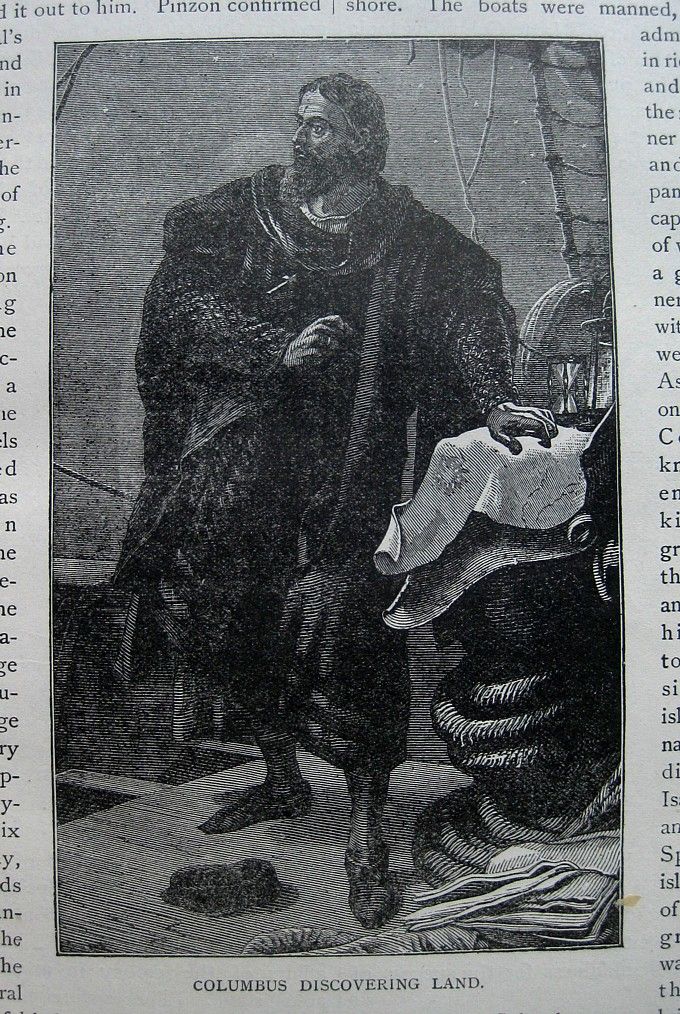
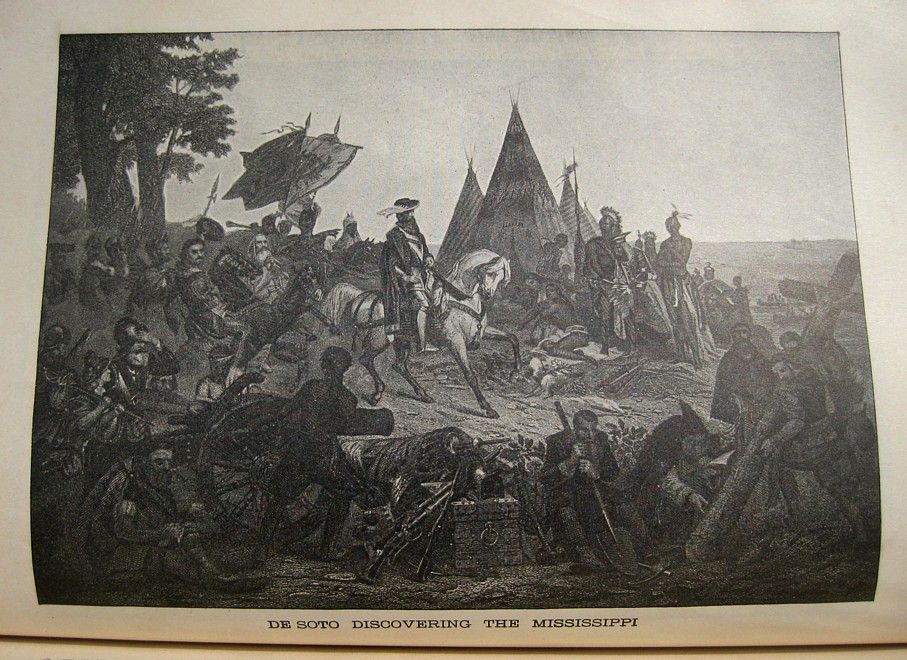
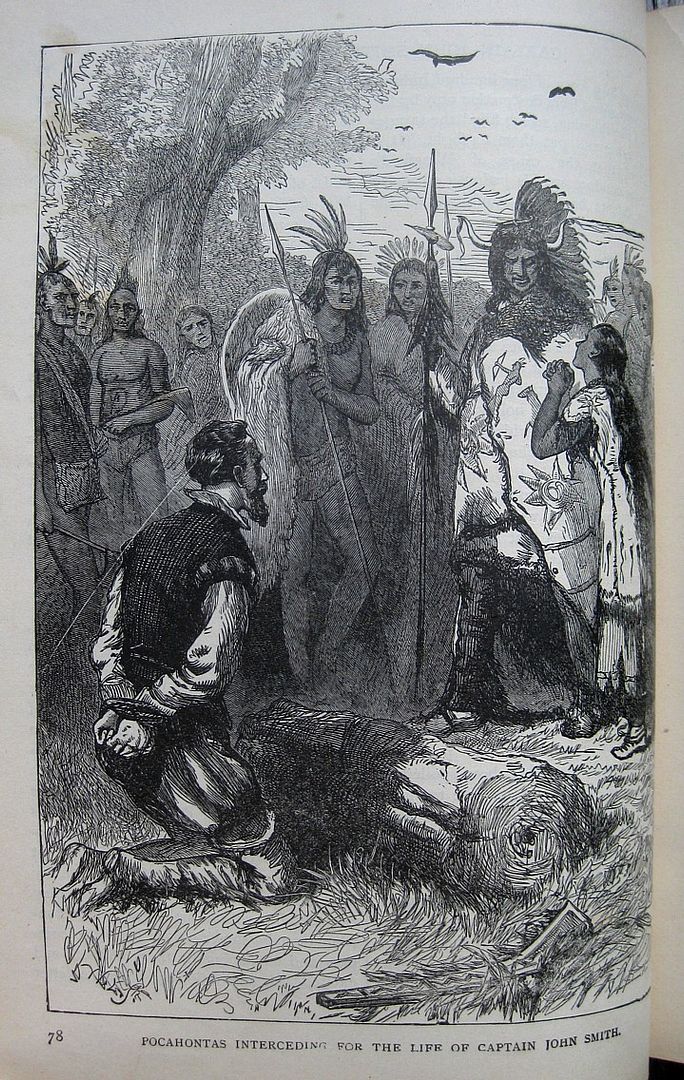
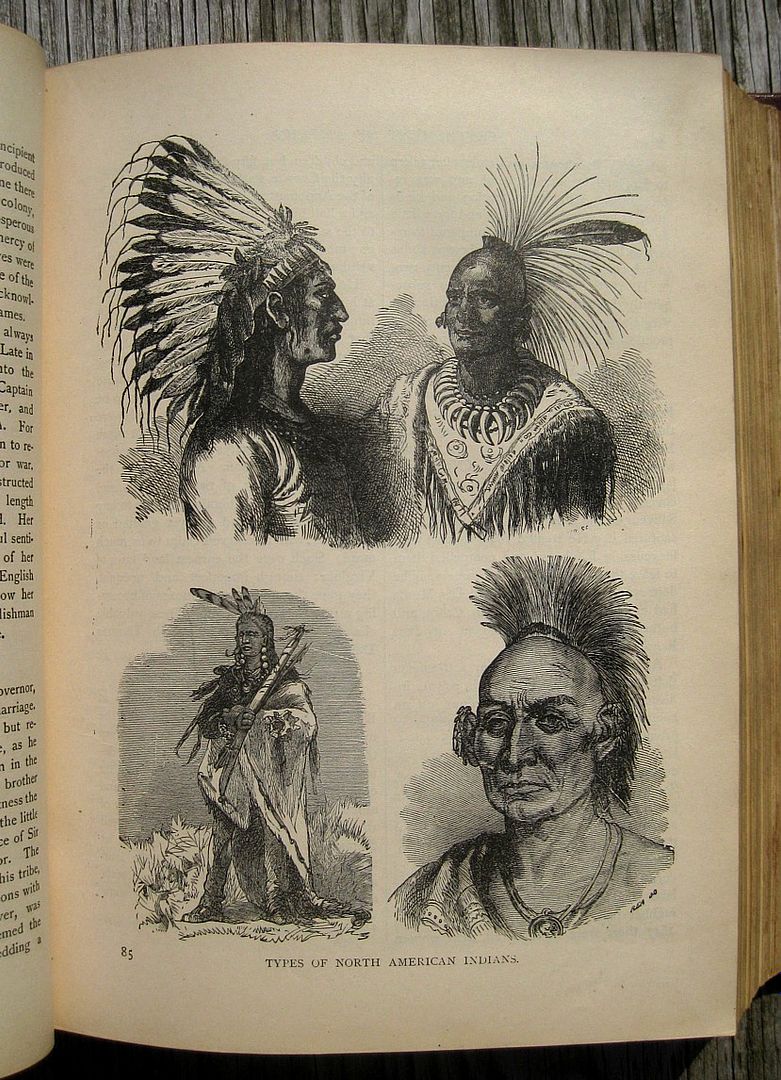
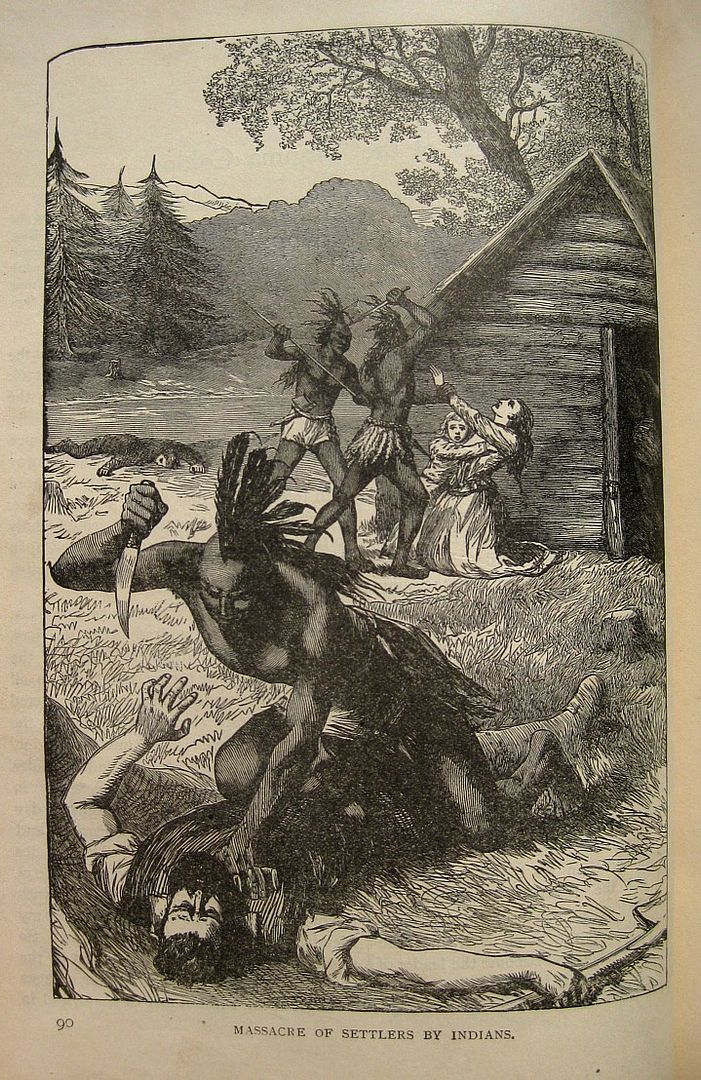
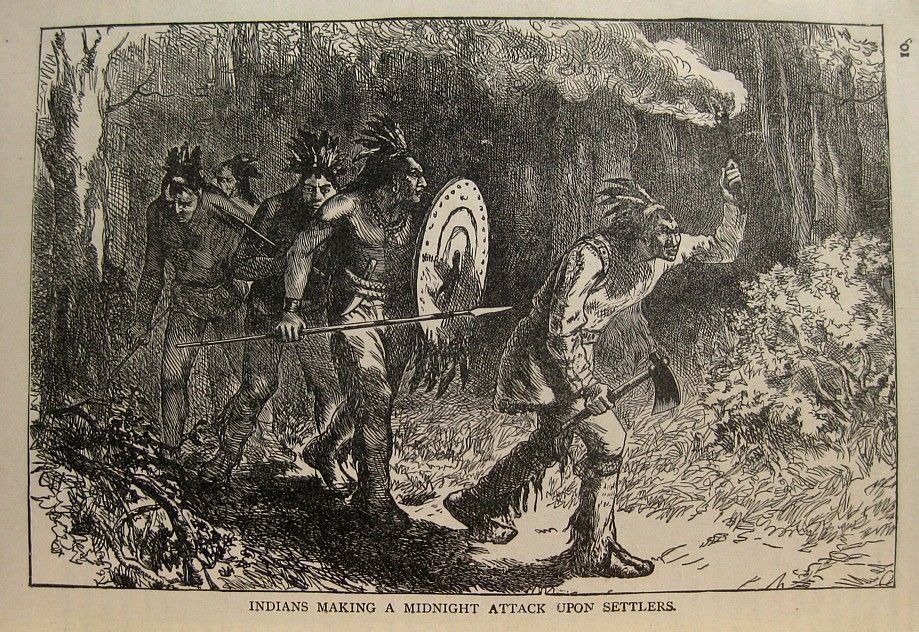
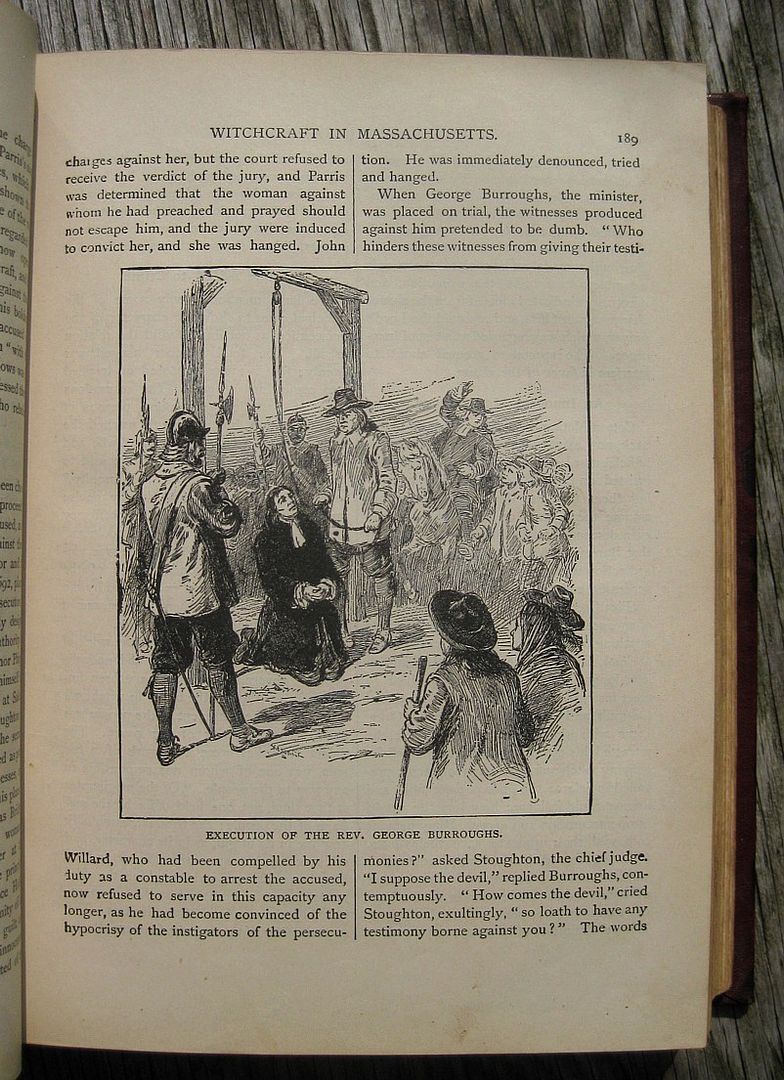
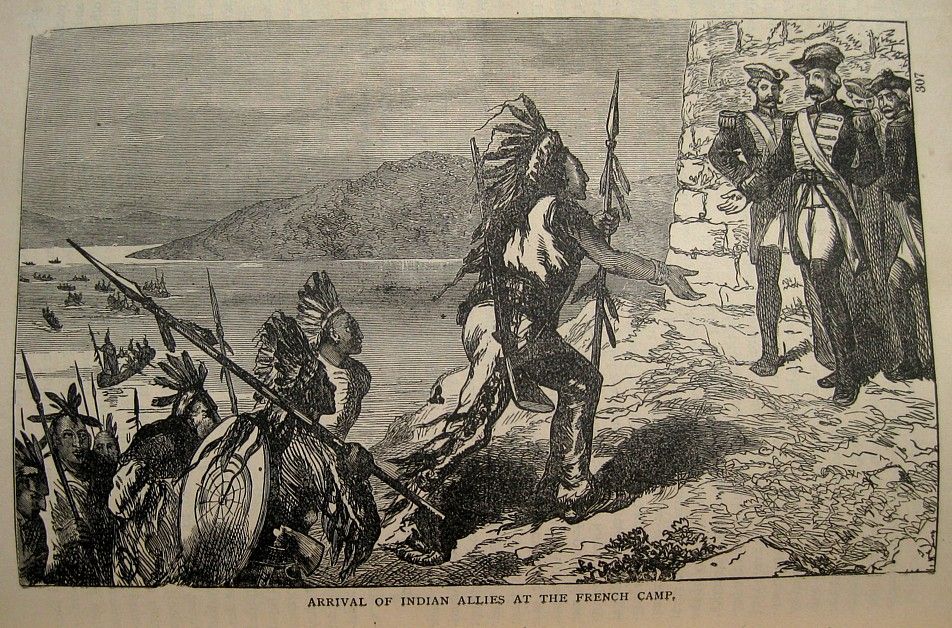
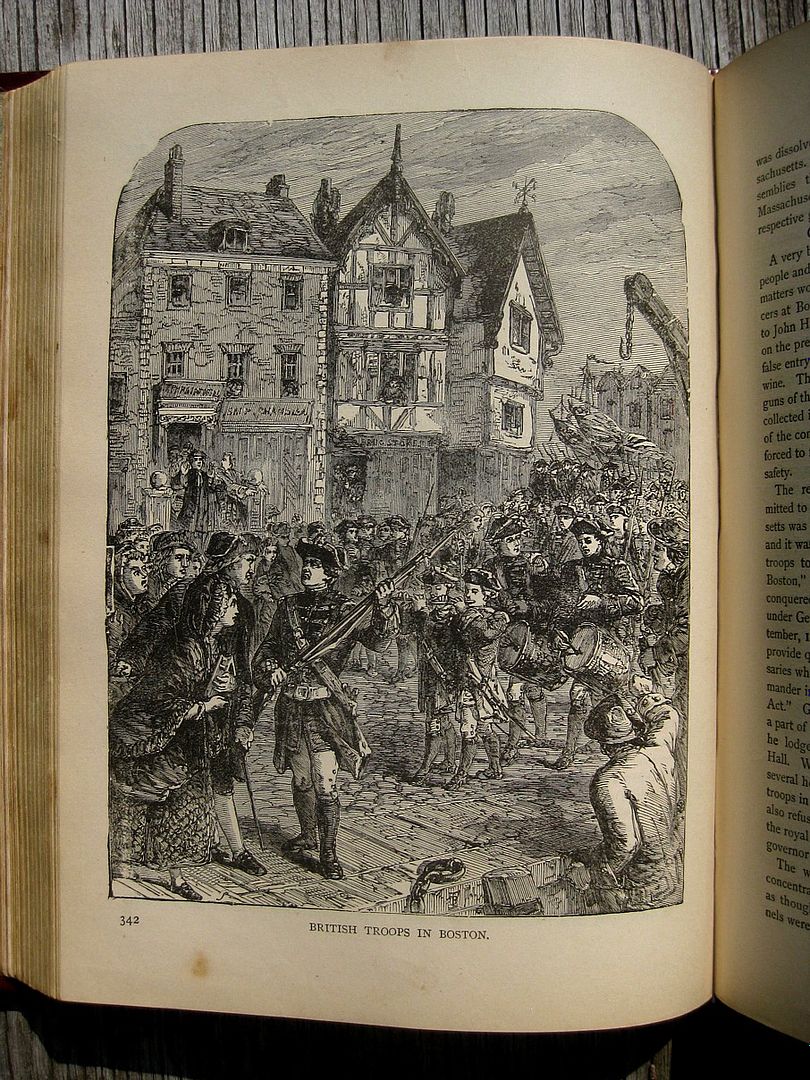
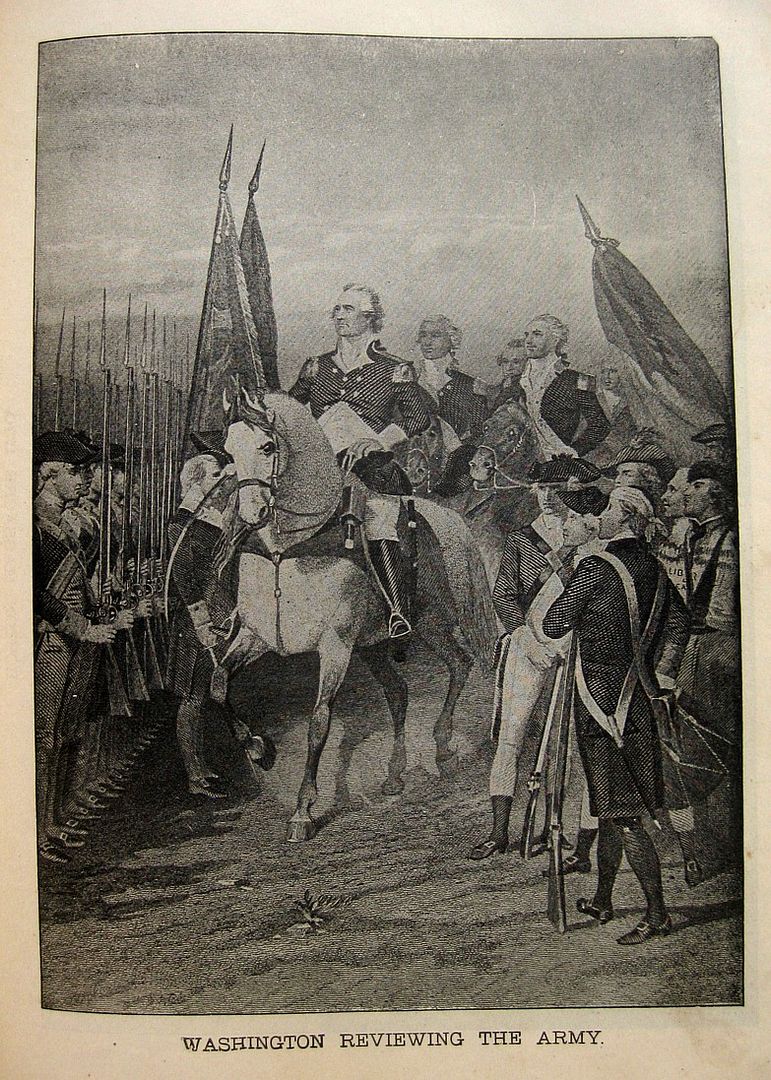
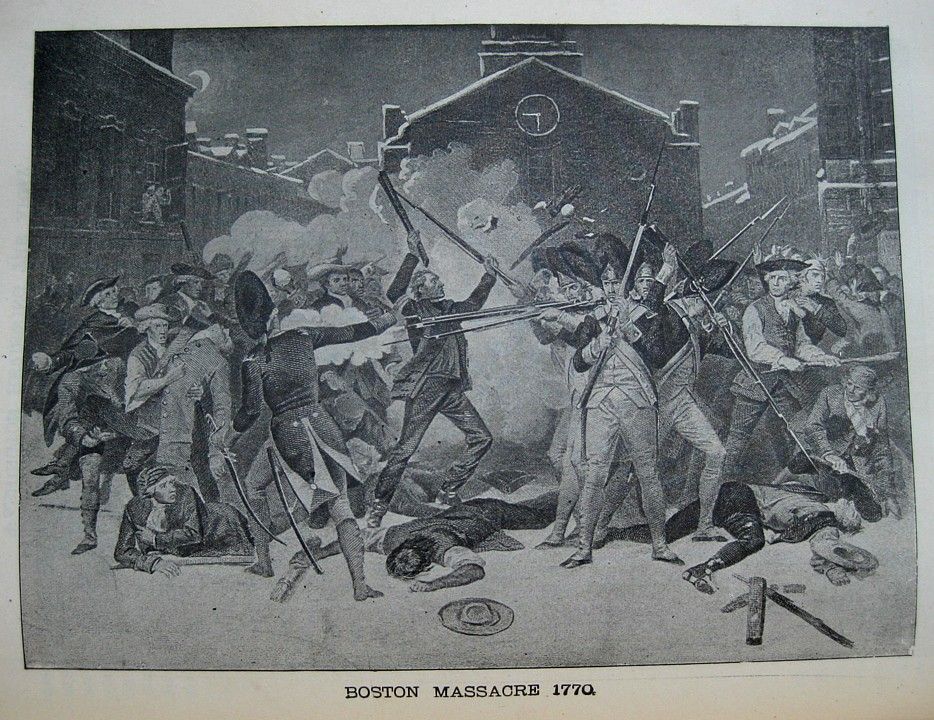
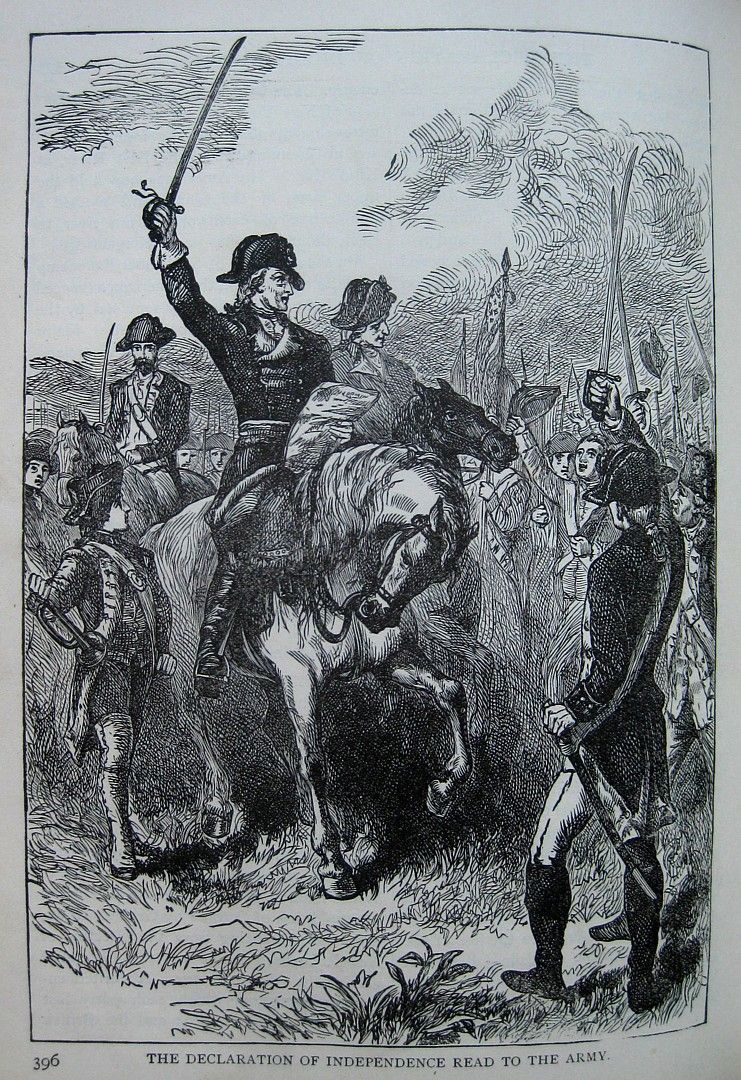
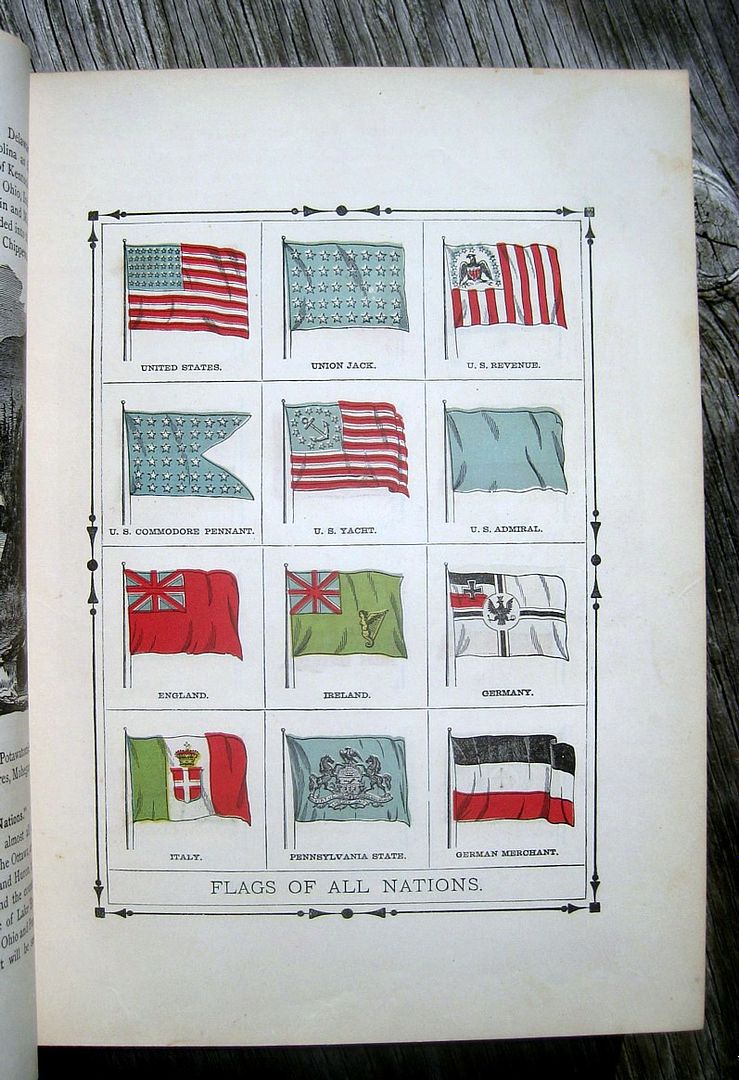
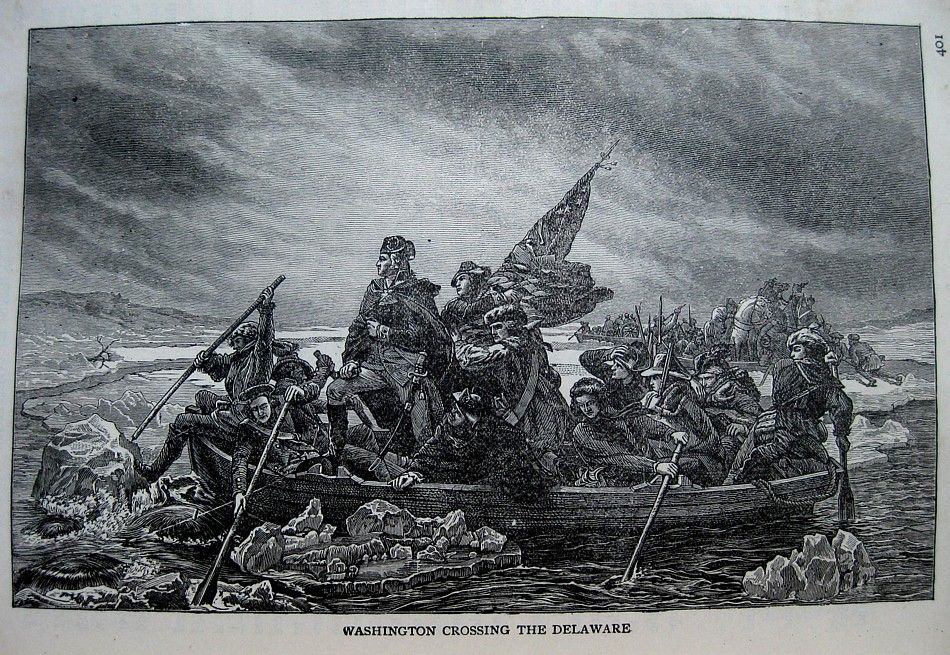
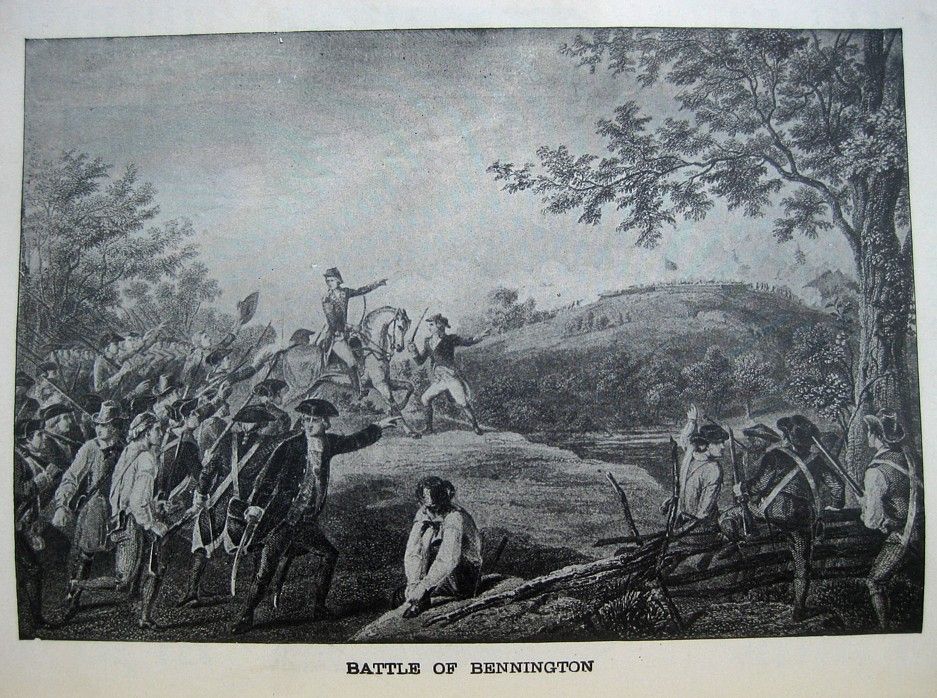
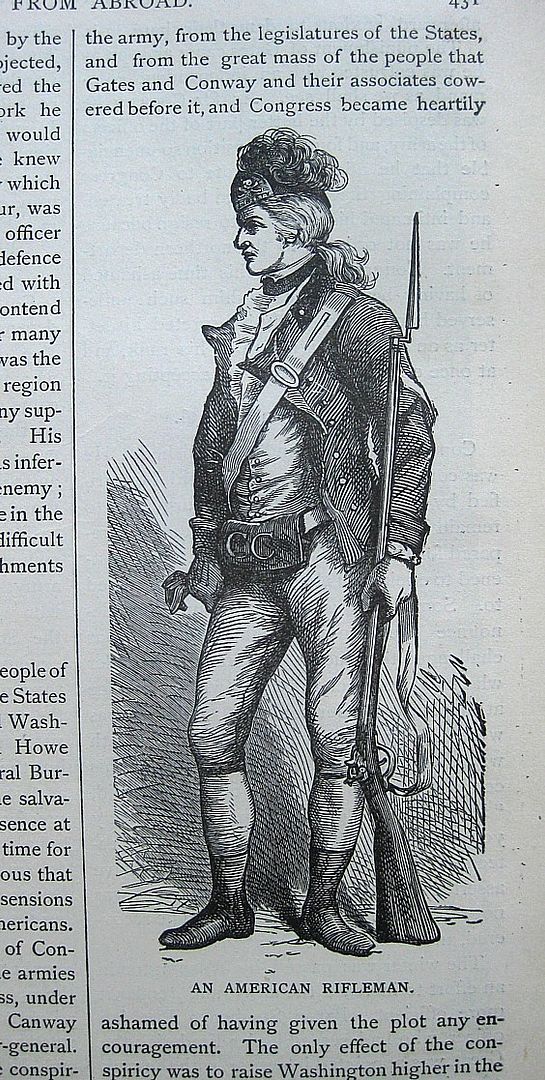
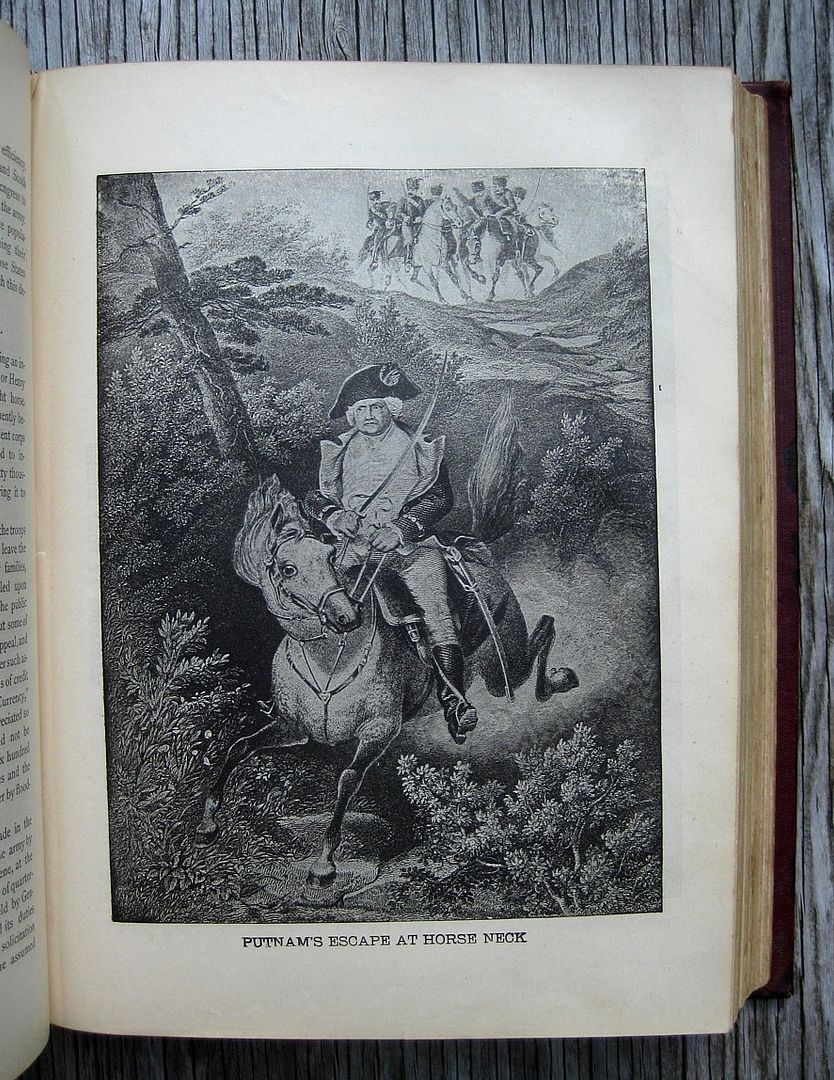
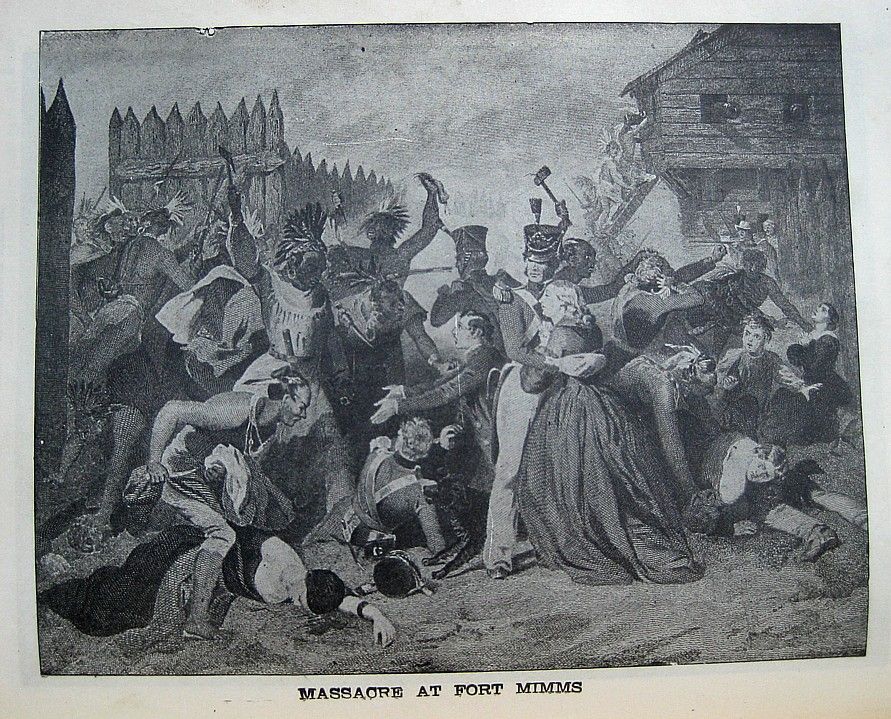
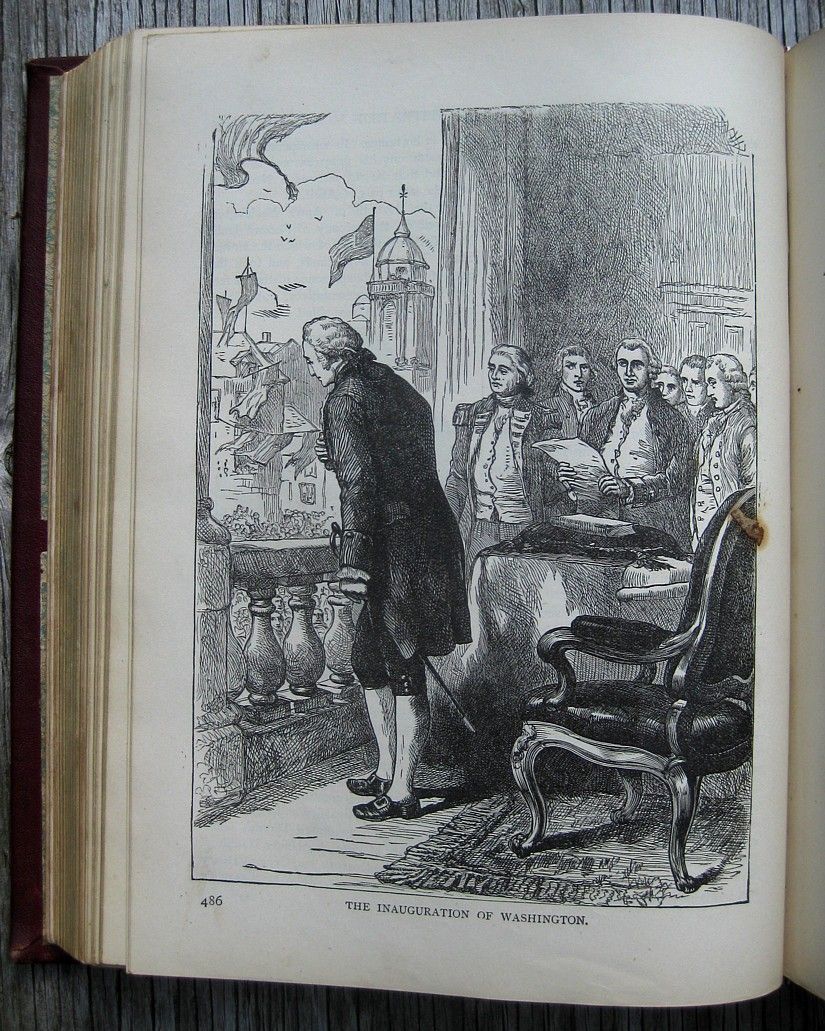
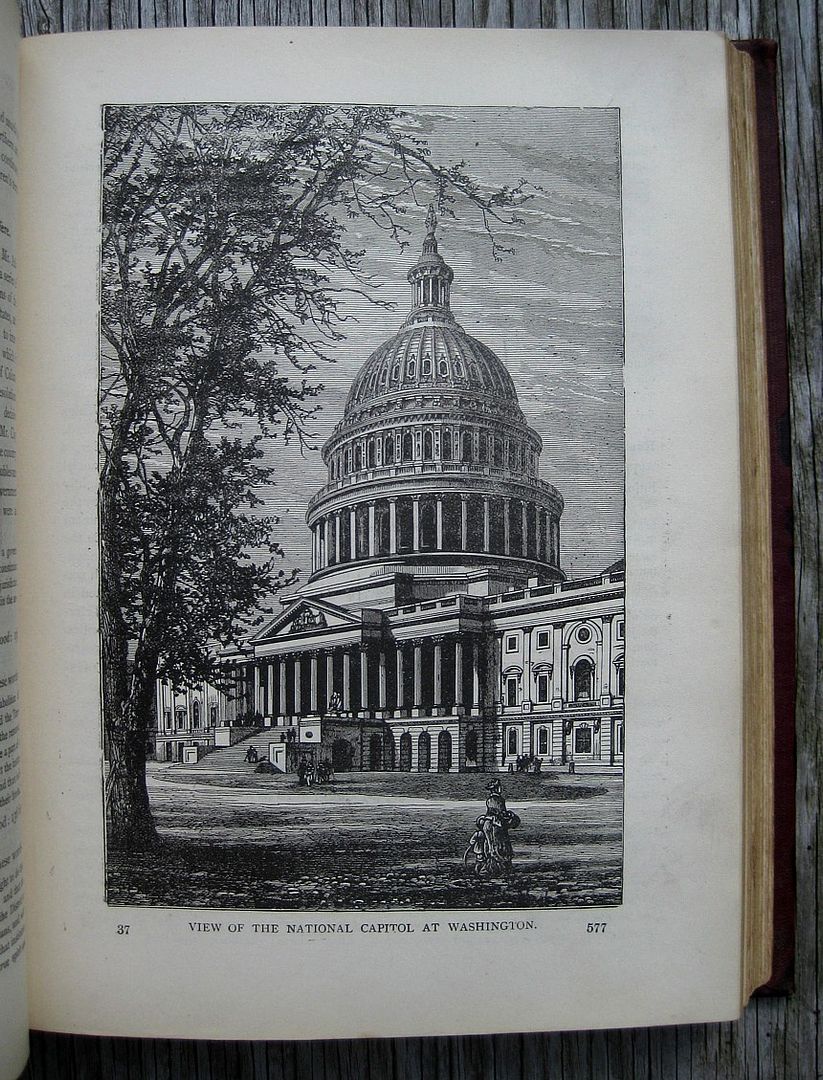
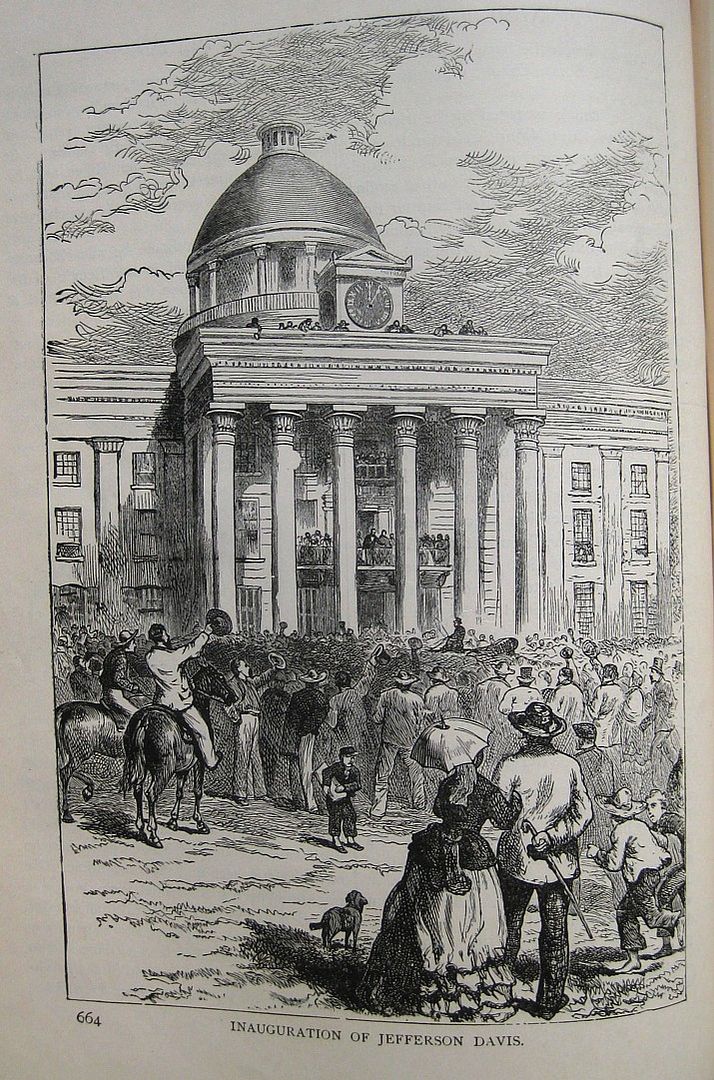
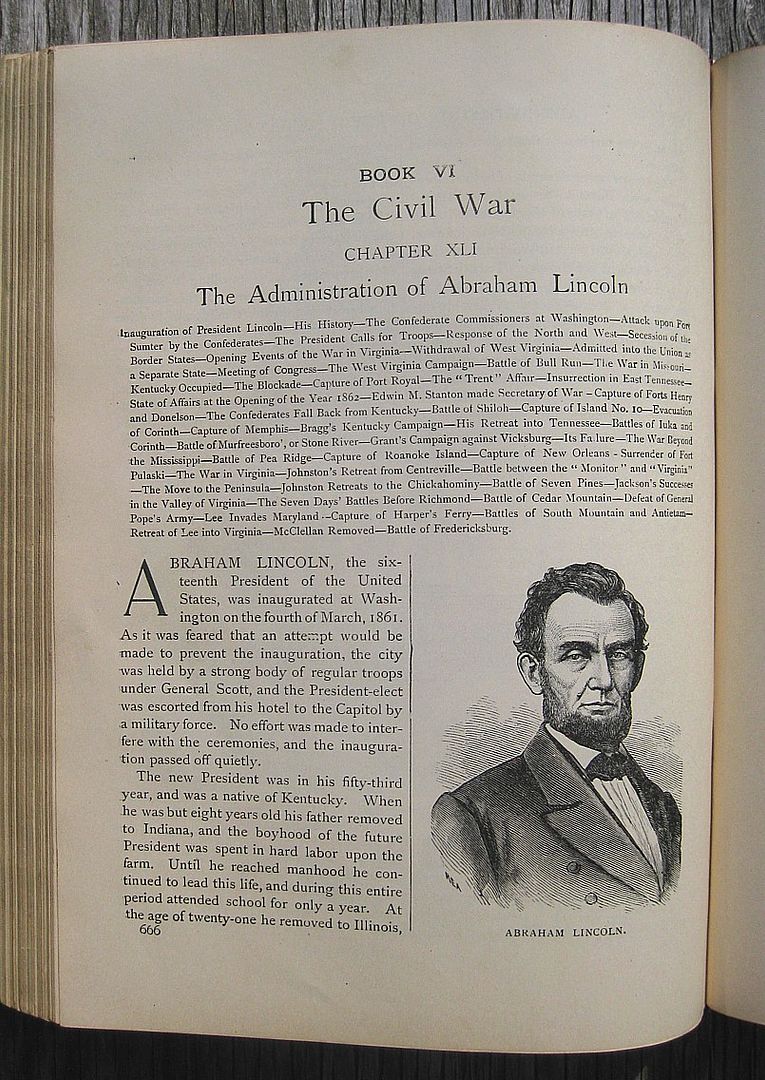
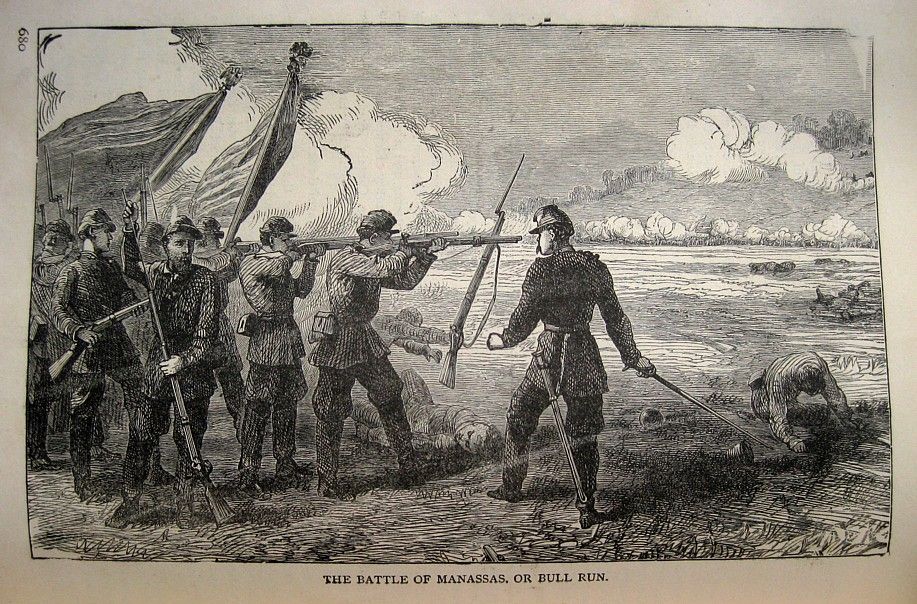
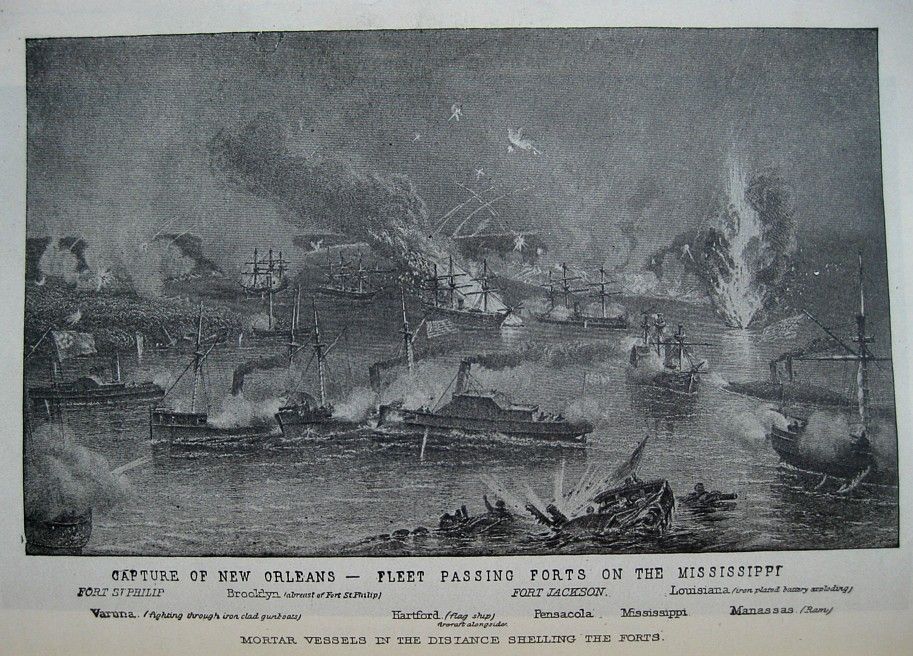
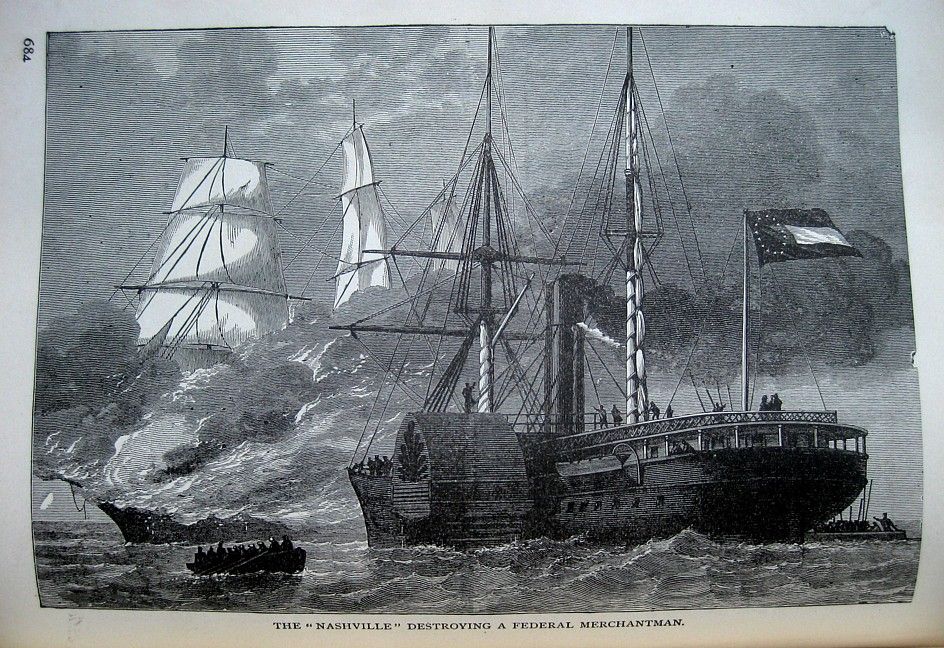
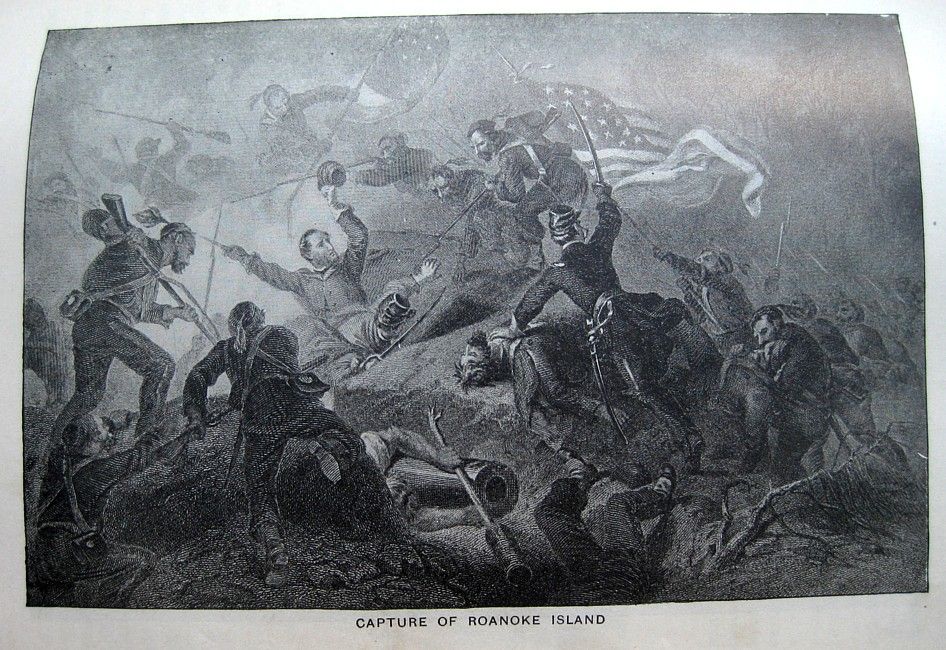
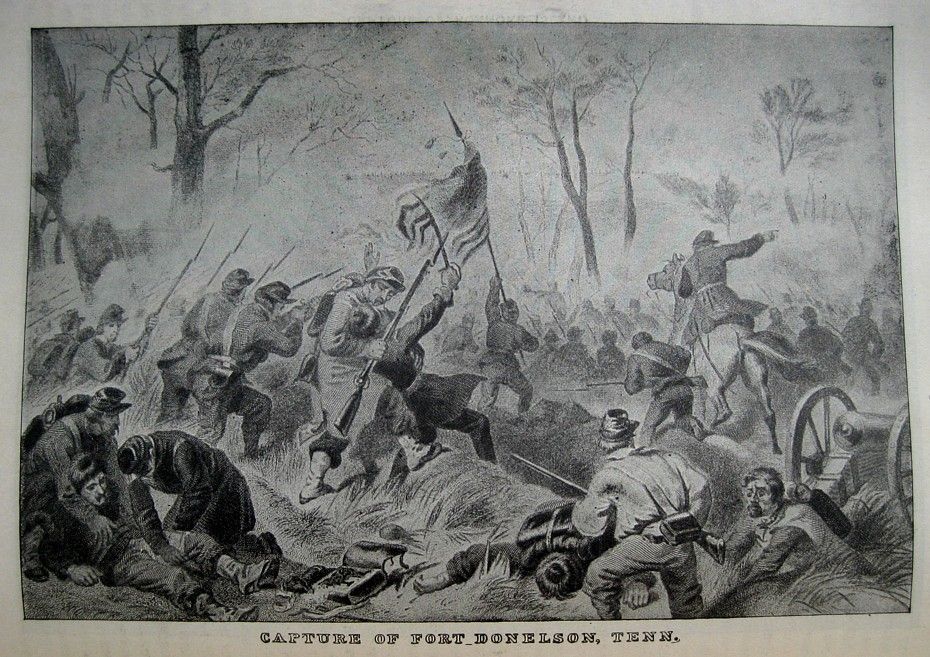
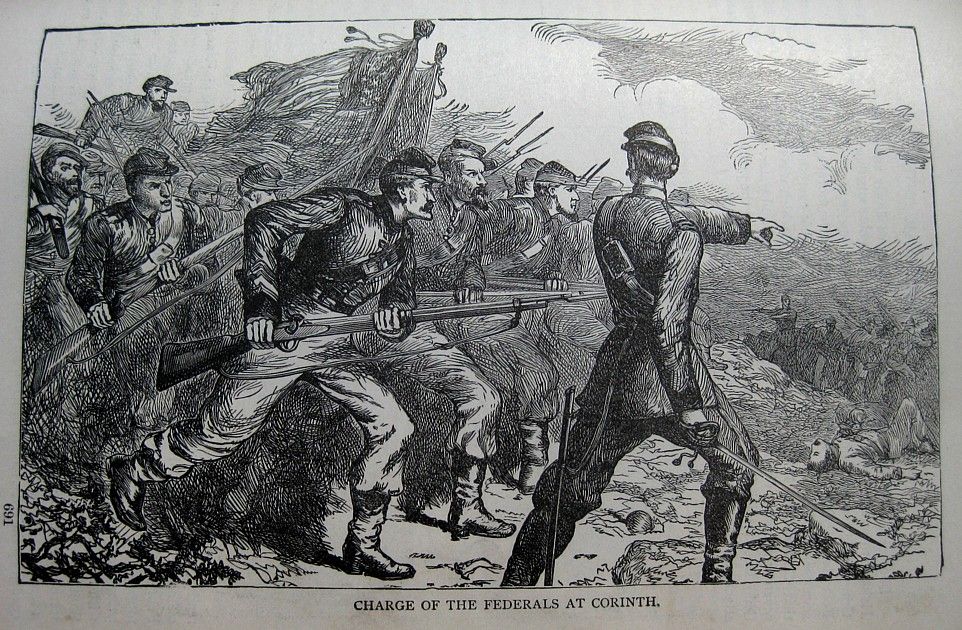
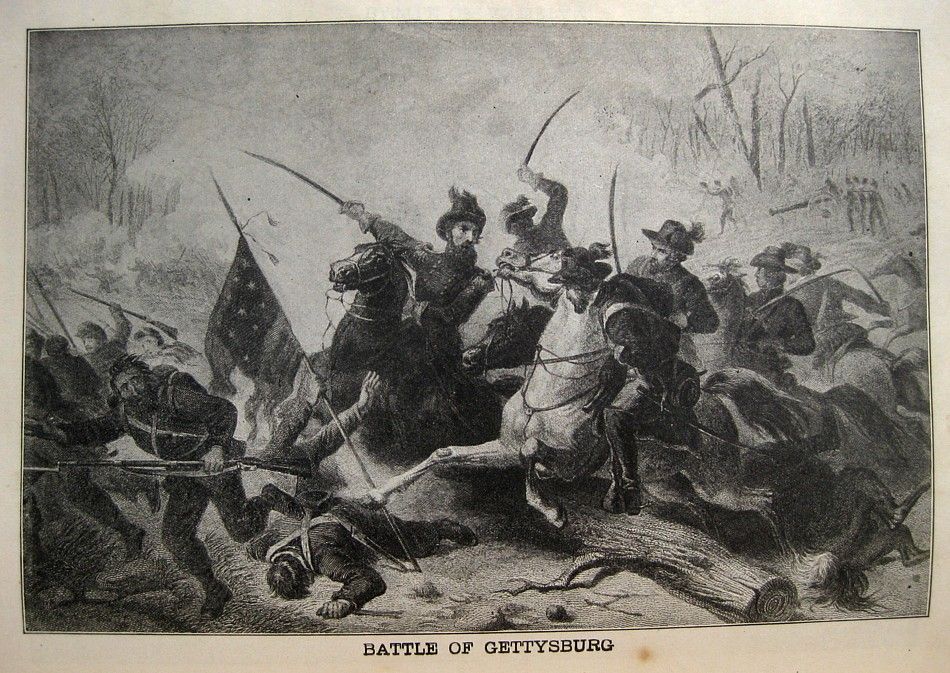
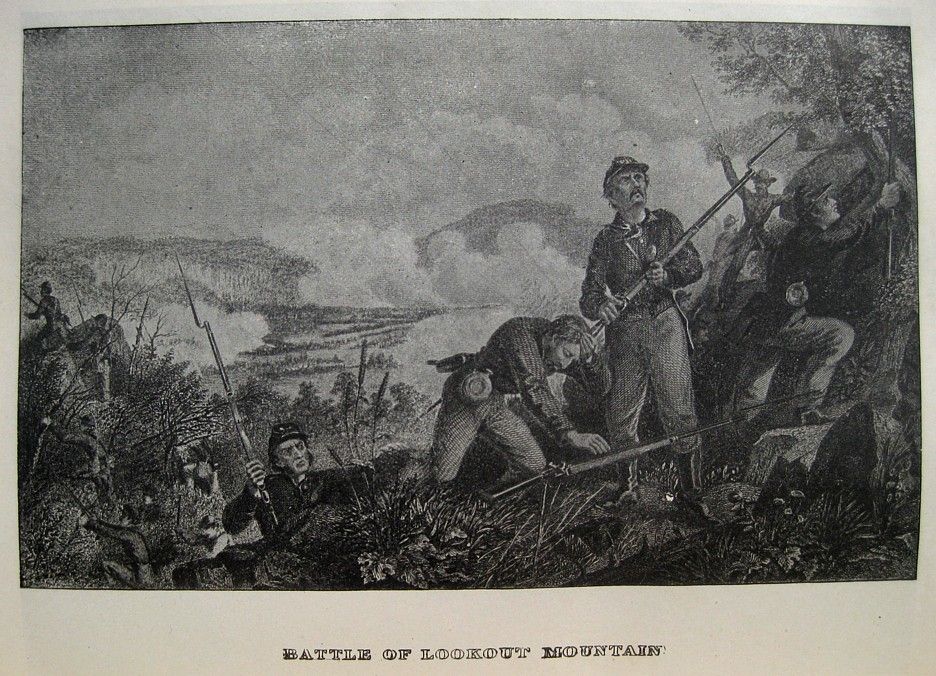
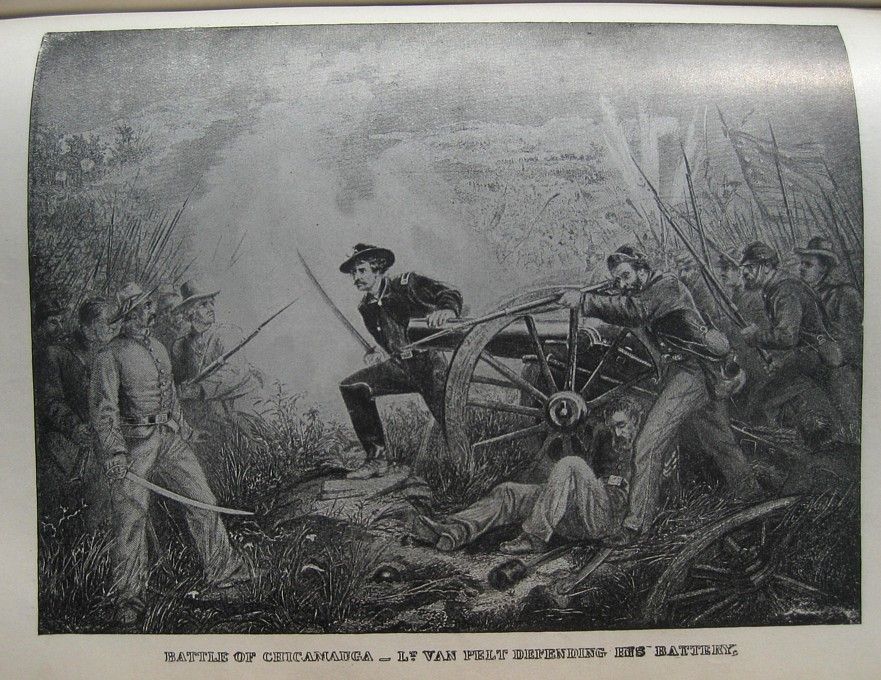
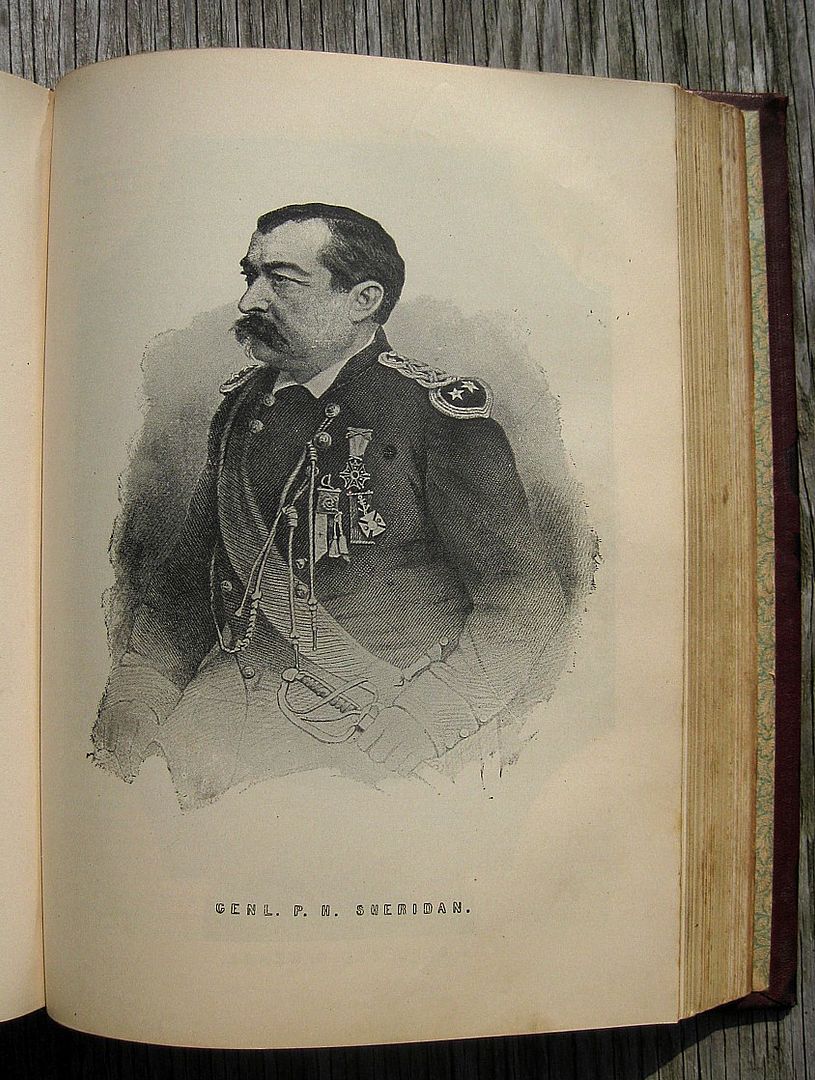
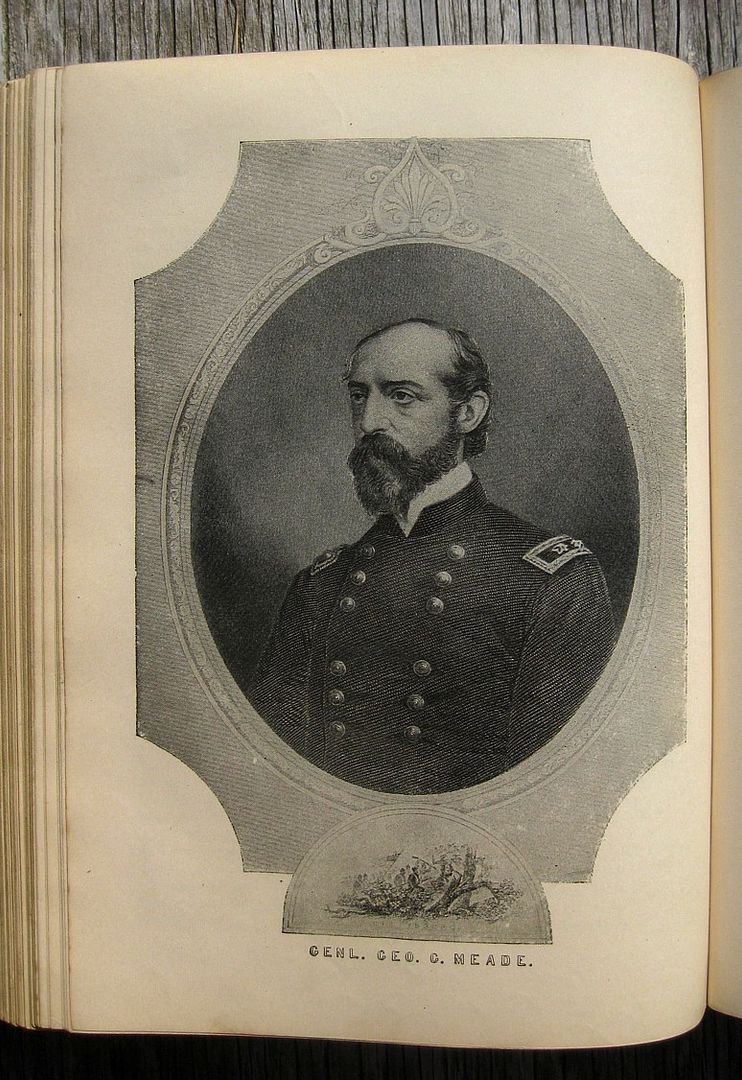
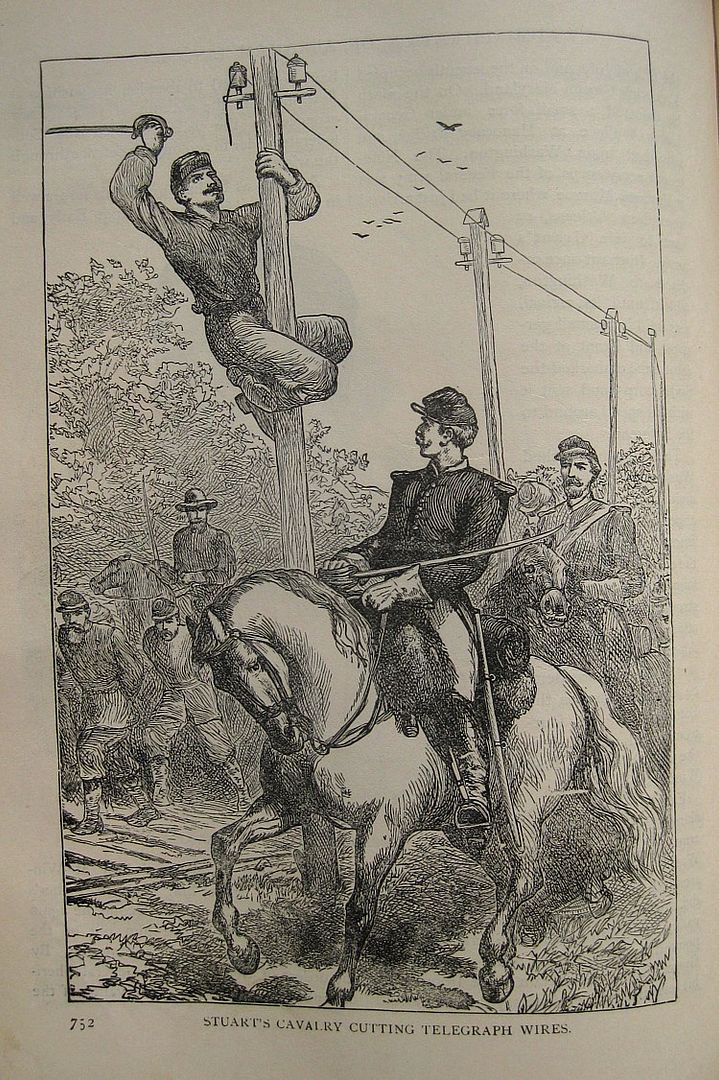
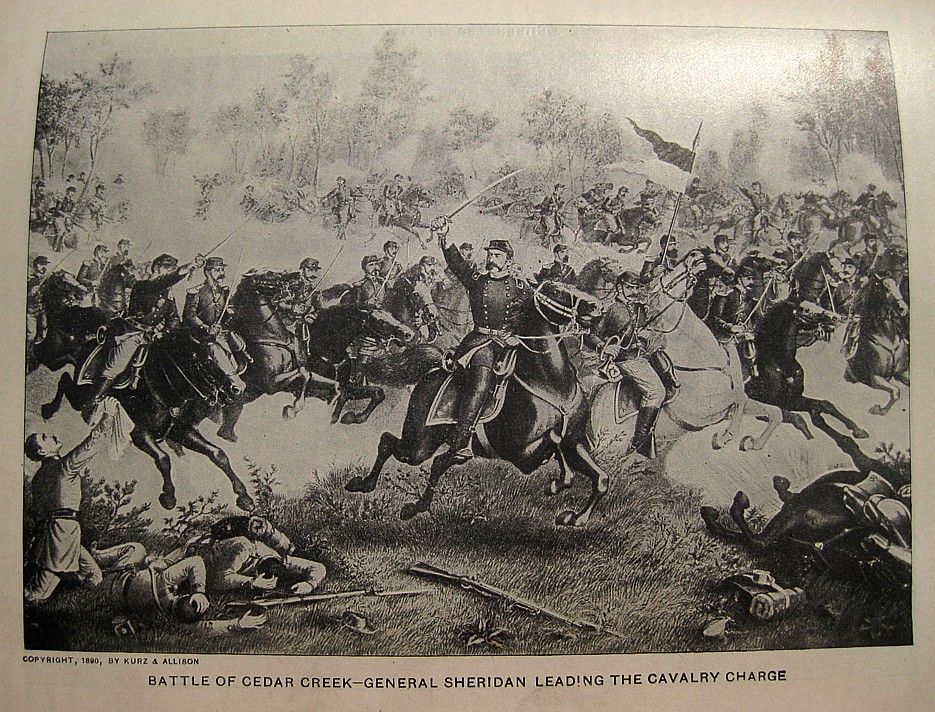
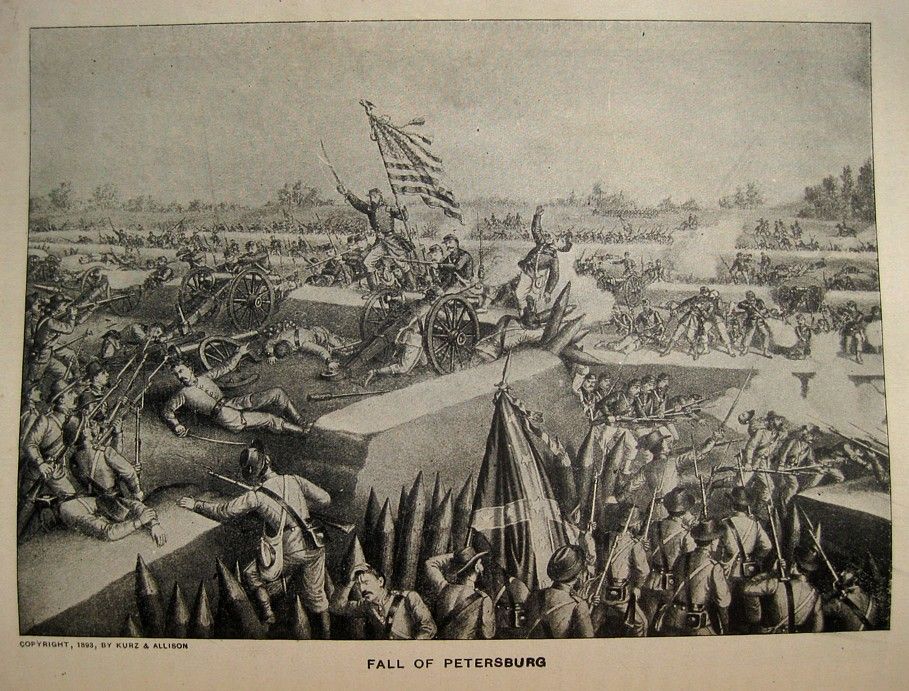
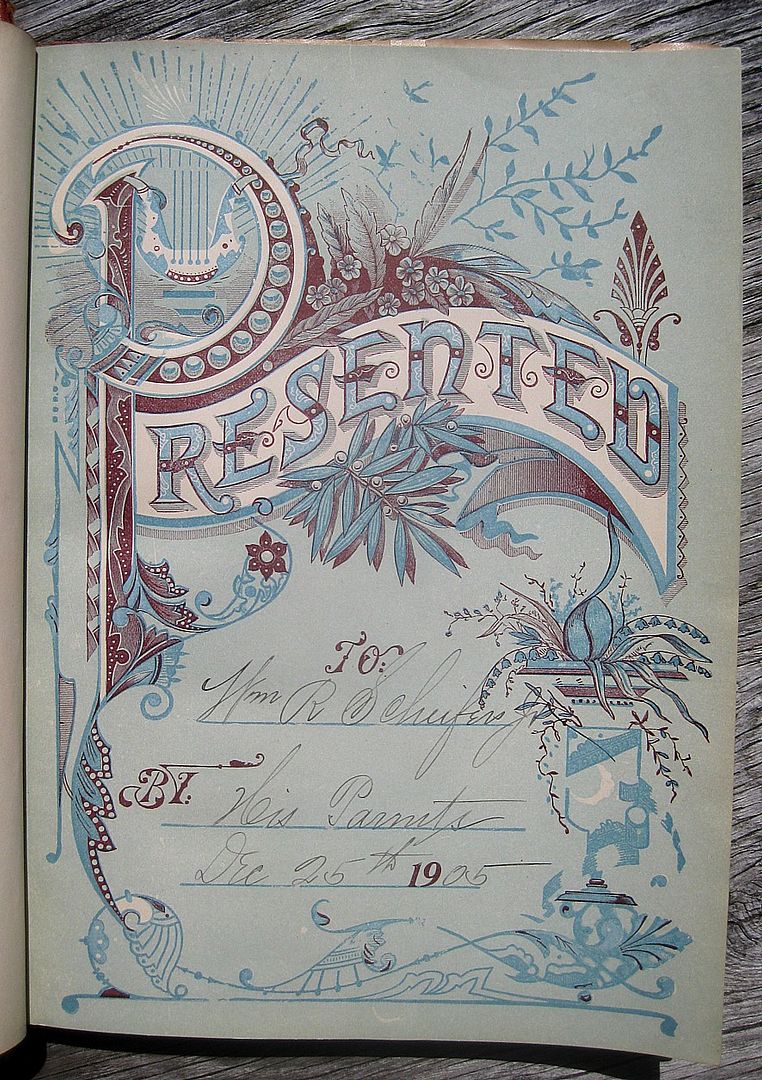
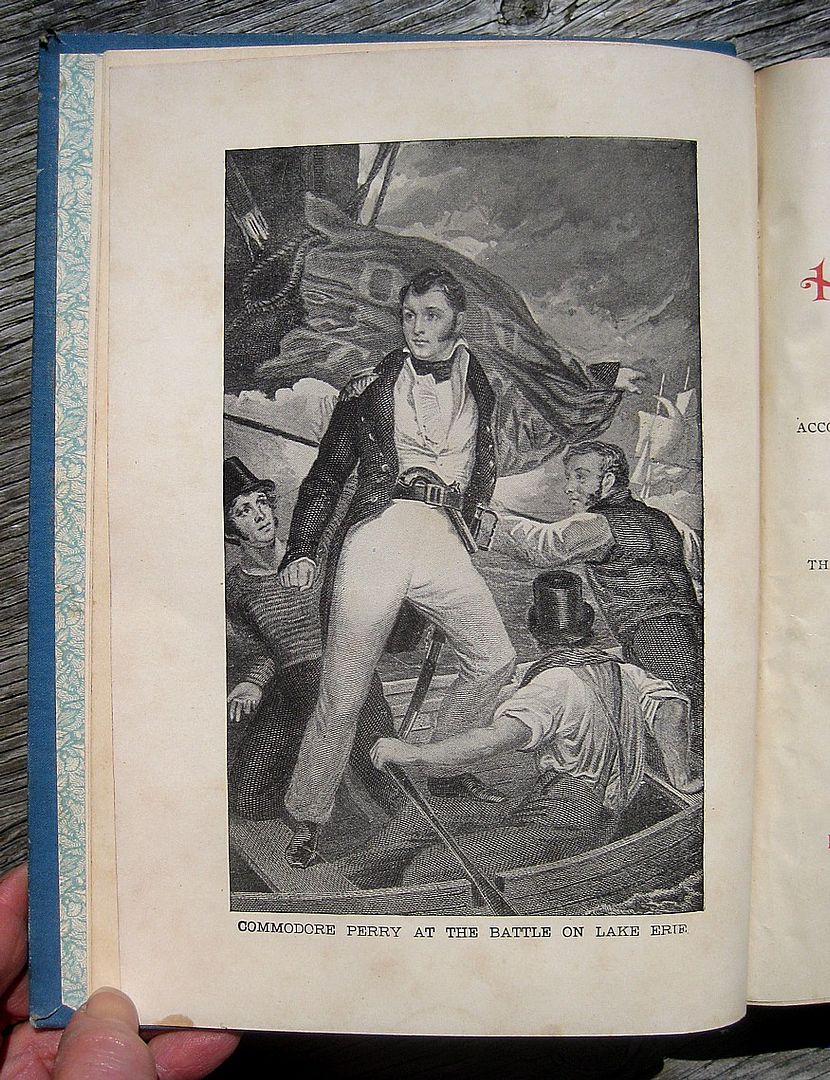
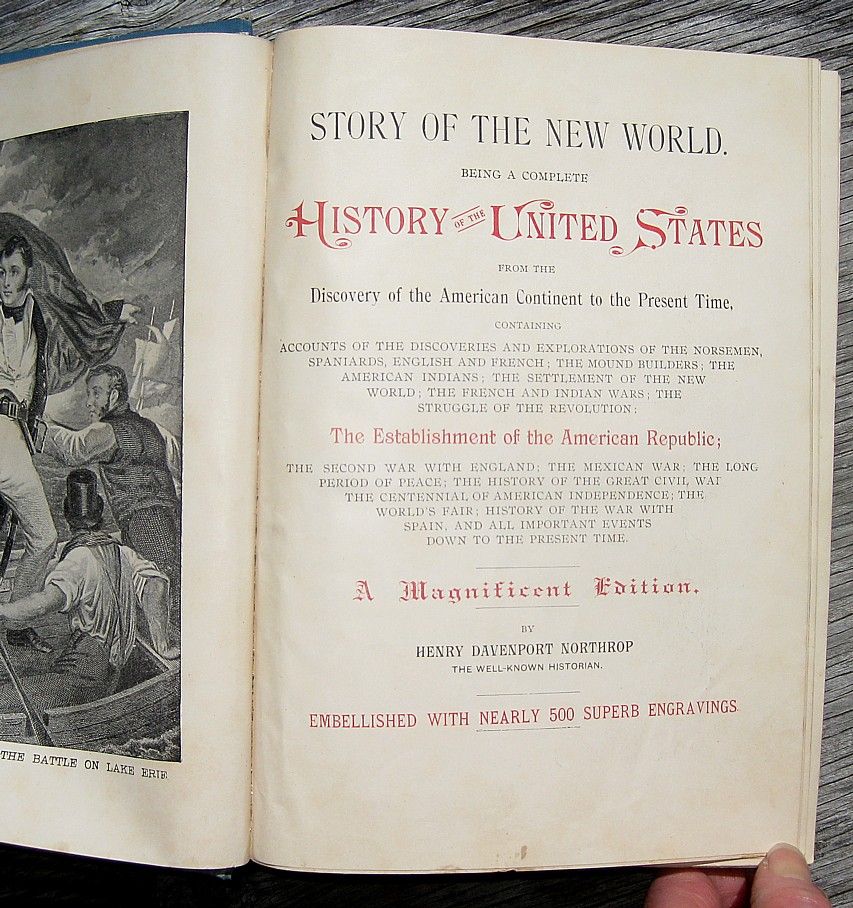
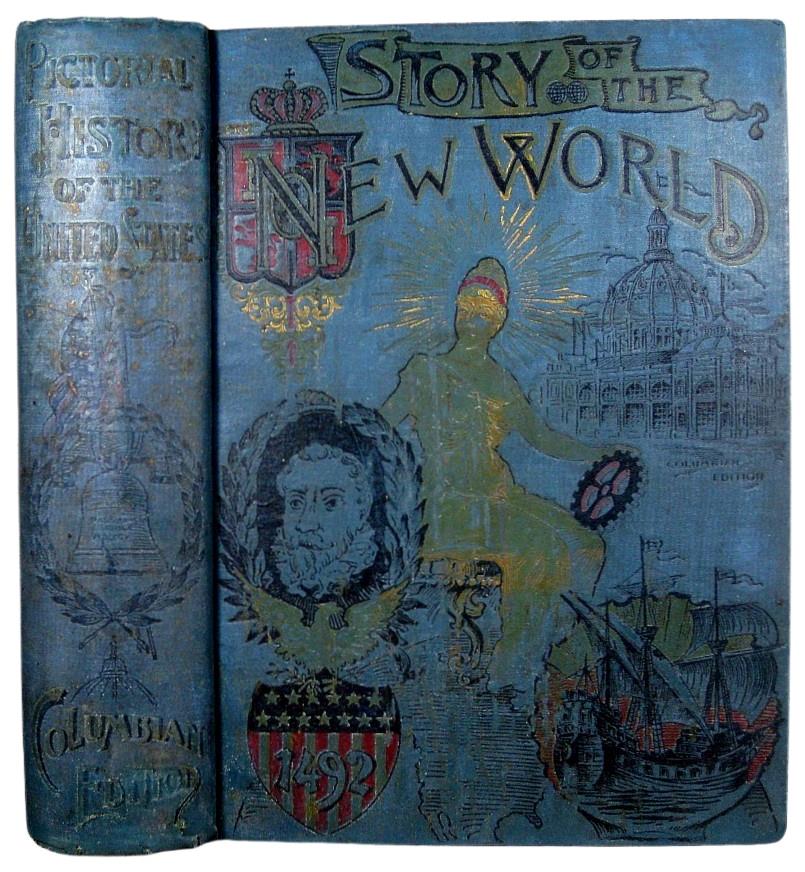
Remember folks, this is an 1899 original. This book is 125 years old.
Check out all the RARE ANTIQUE BOOKS ABOUT THE INDIAN WARS, CIVIL WAR, REVOLUTIONARY WAR AND THE OLD WEST THAT I'M OFFERING ON EBAY THIS WEEK!
Please be sure to add me to your List of Favorite Sellers!
Don't miss out on any of my latest listings. Click here to sign up for the NEETMOK NEWSLETTER!
Winner pays for media mail shipping in the United States of America.
© 2024 by eBay seller neetmok. NEETMOK BOOKS IS A REGISTERED MEMBER OF EBAY’S VERO PROGRAM. Unauthorized use of Item Description Text or Images is a violation of eBay rules, as posted by eBay: "No Copying Allowed! When you prepare your listings you generally should use only material (text, photographs, etc.) and trademarks/names that you created or own yourself or licensed from the owners." Auction page content (i.e., item description text; lists of contents, lists of illustrations/photos; scanned images, etc.) was written/compiled/formatted by eBay seller neetmok and, as intellectual property, is protected by copyright. UNAUTHORIZED USE OF ITEM DESCRIPTION TEXT INCLUDING SUMMARIES OF CONTENTS, ILLUSTRATIONS, ETC., PHOTOS OR OTHER PROPRIETARY INTELLECTUAL PROPERTY IS STRICTLY PROHIBITED AND WILL BE REPORTED TO EBAY’S VERO DEPARTMENT FOR IMMEDIATE ACTION.
On Apr 13, 2024 at 06:52:49 PDT, seller added the following information: